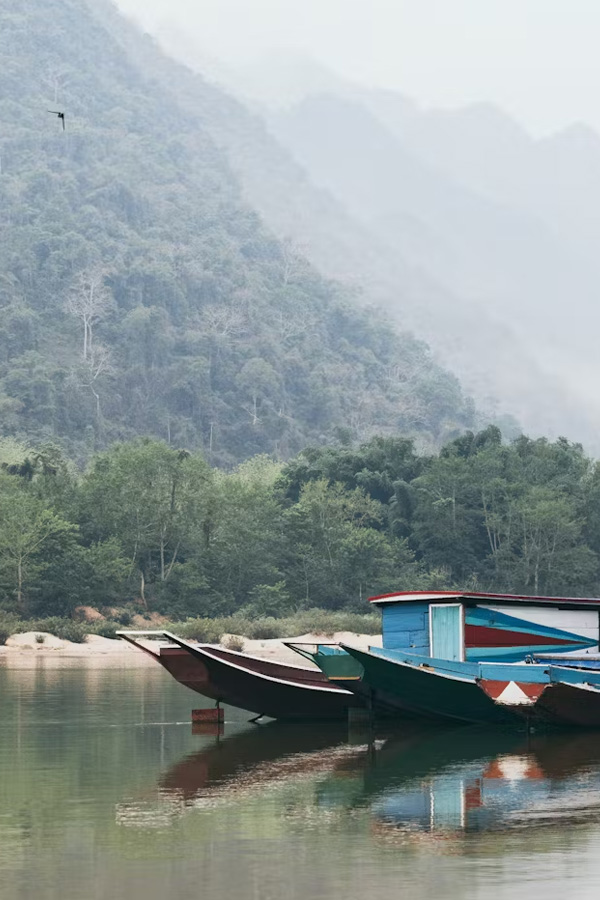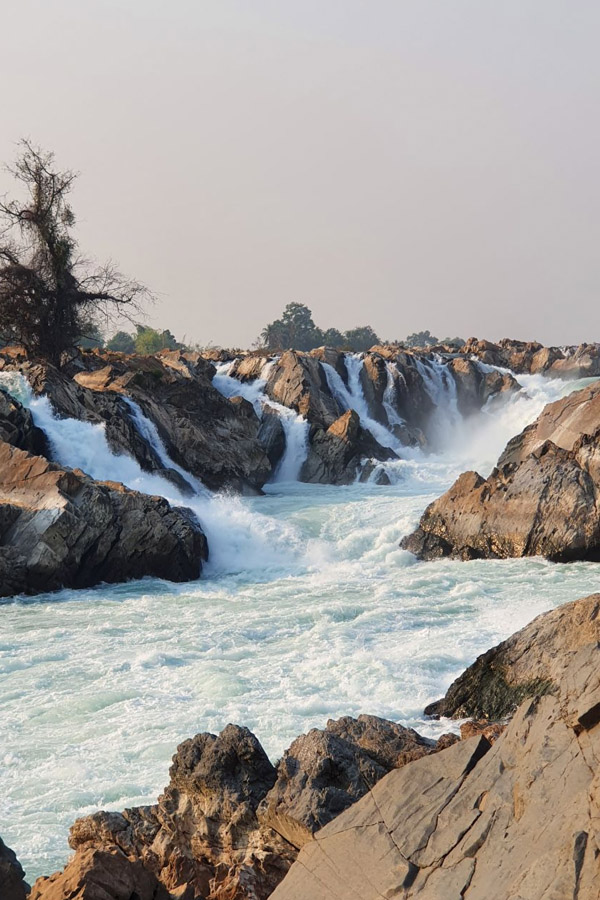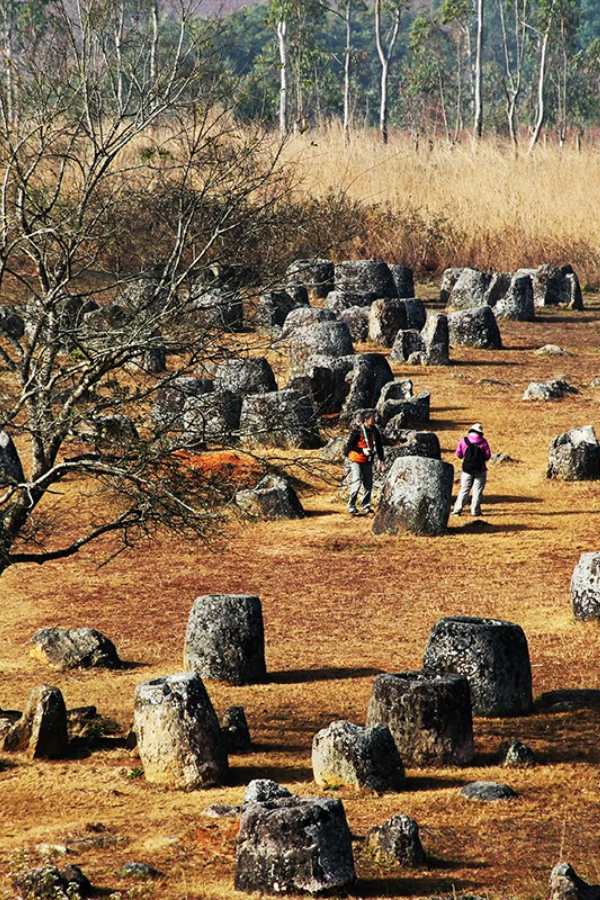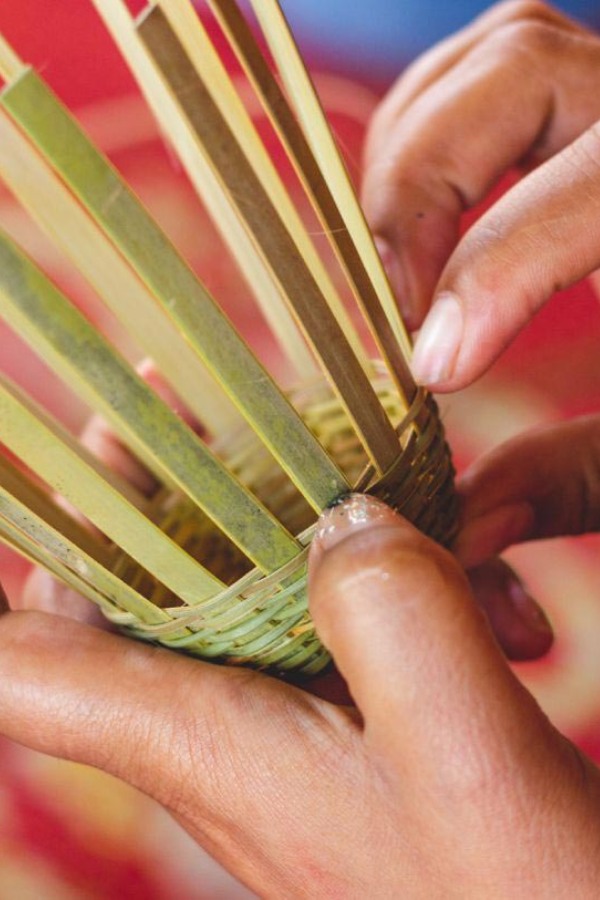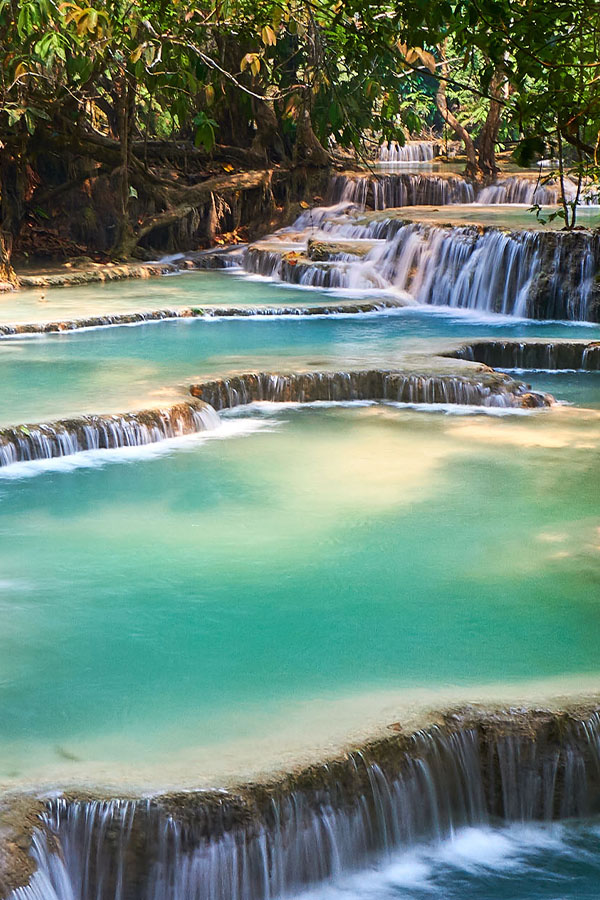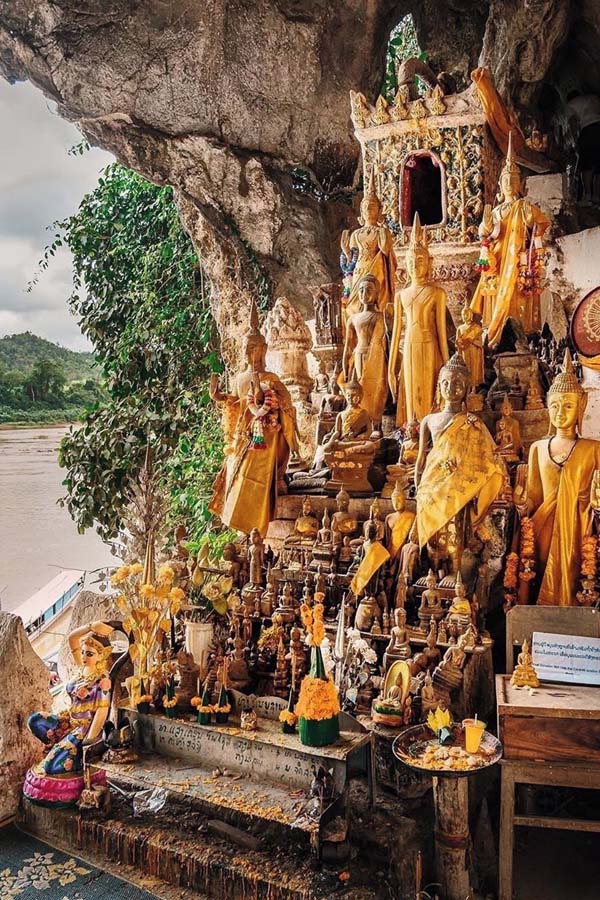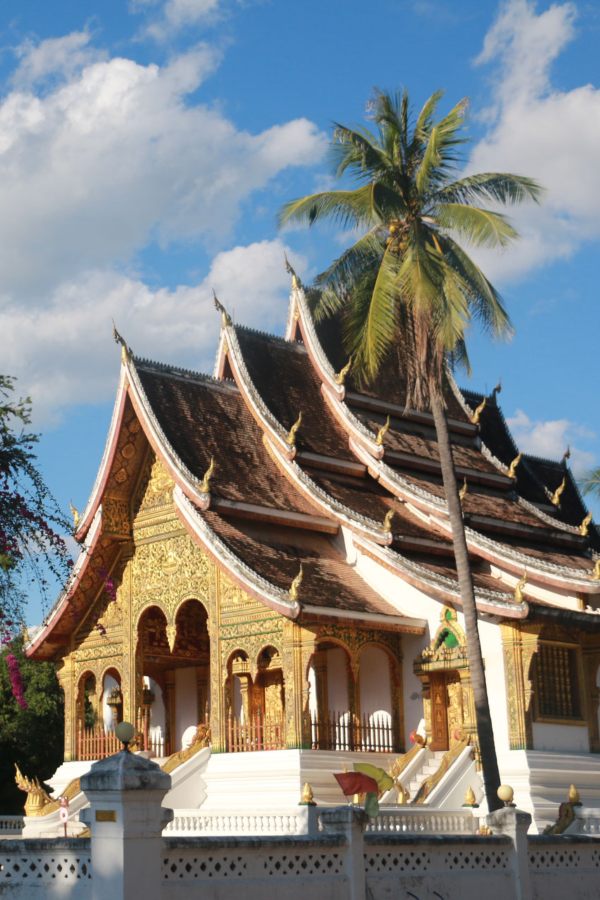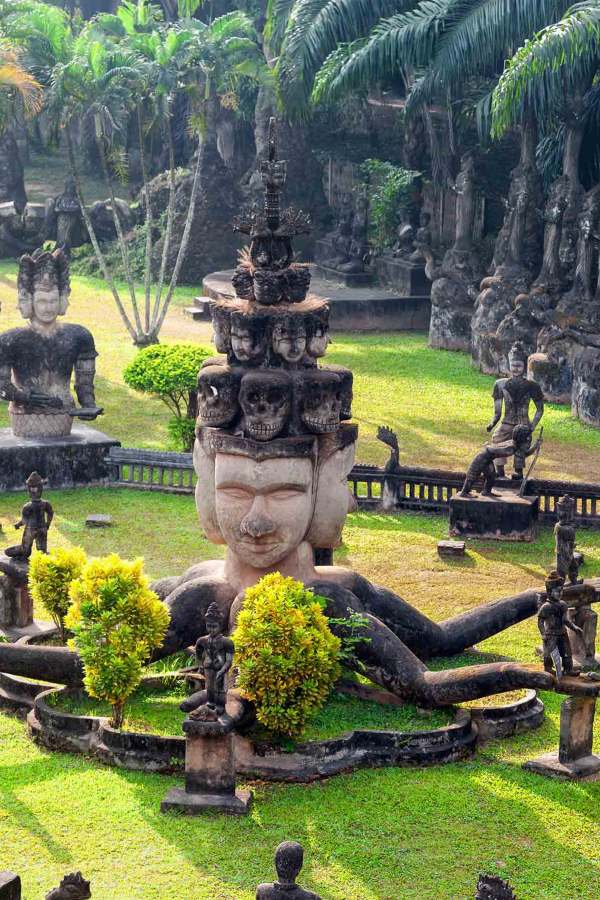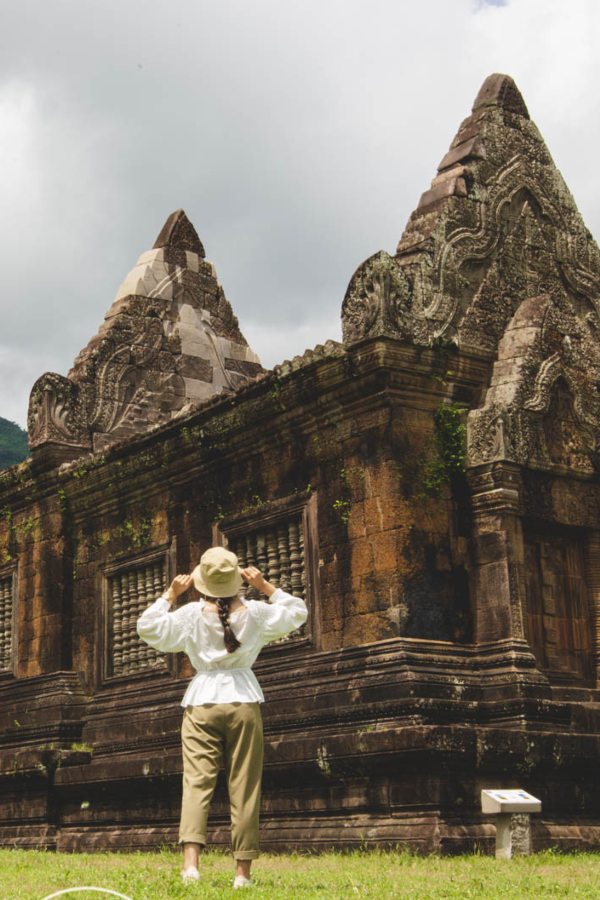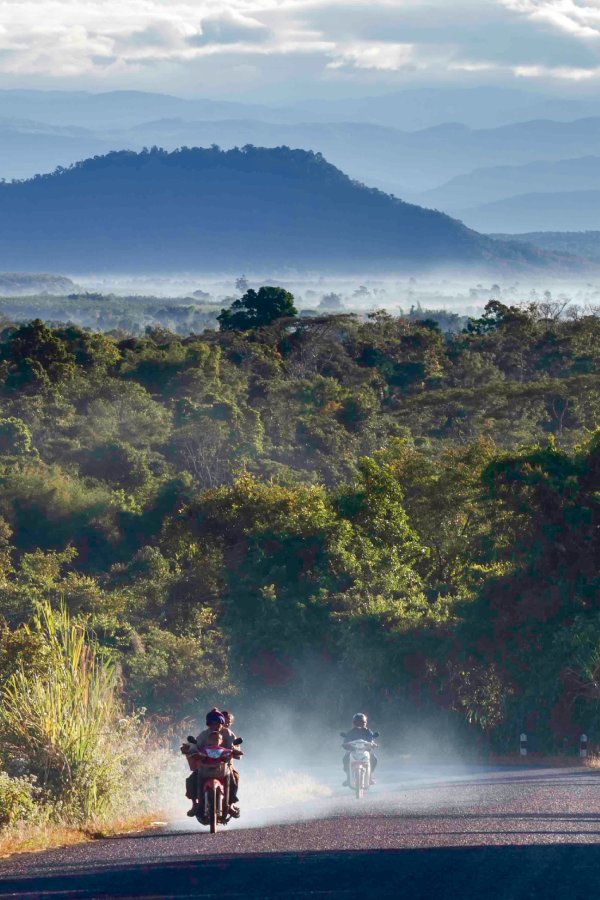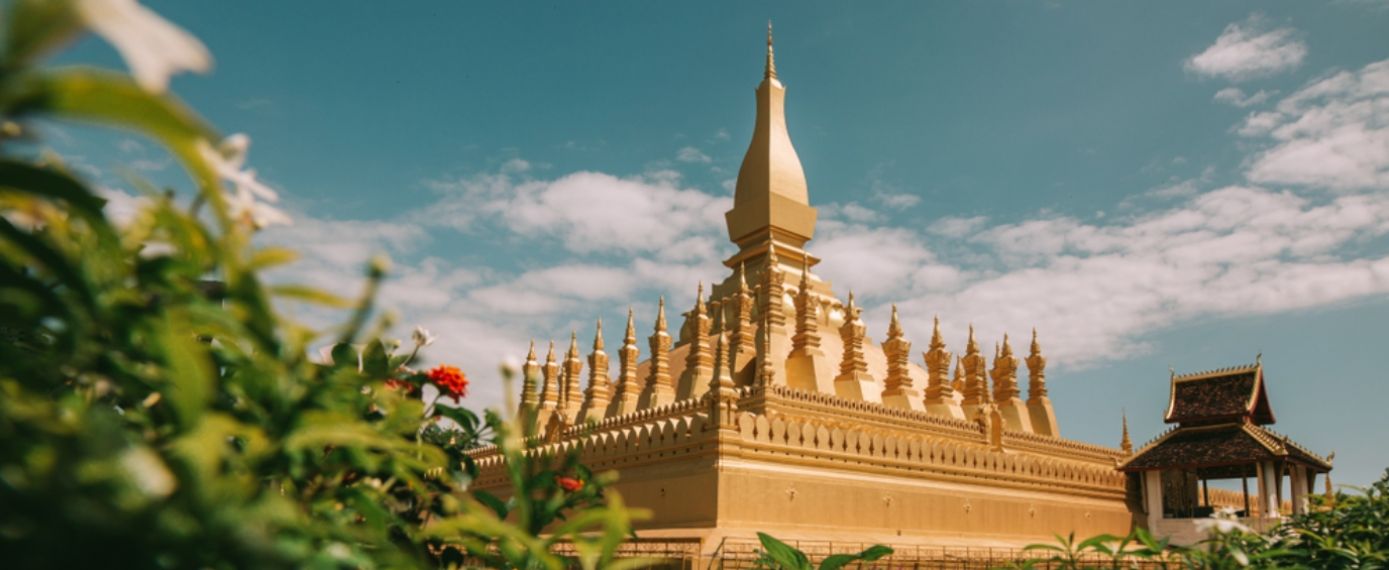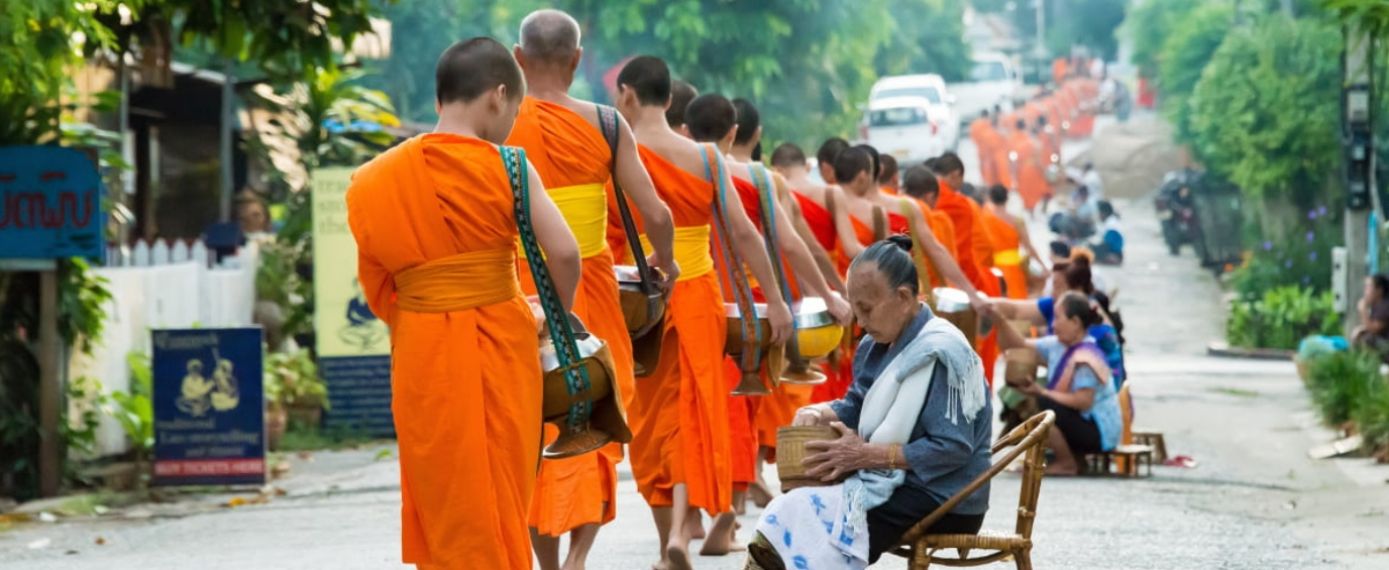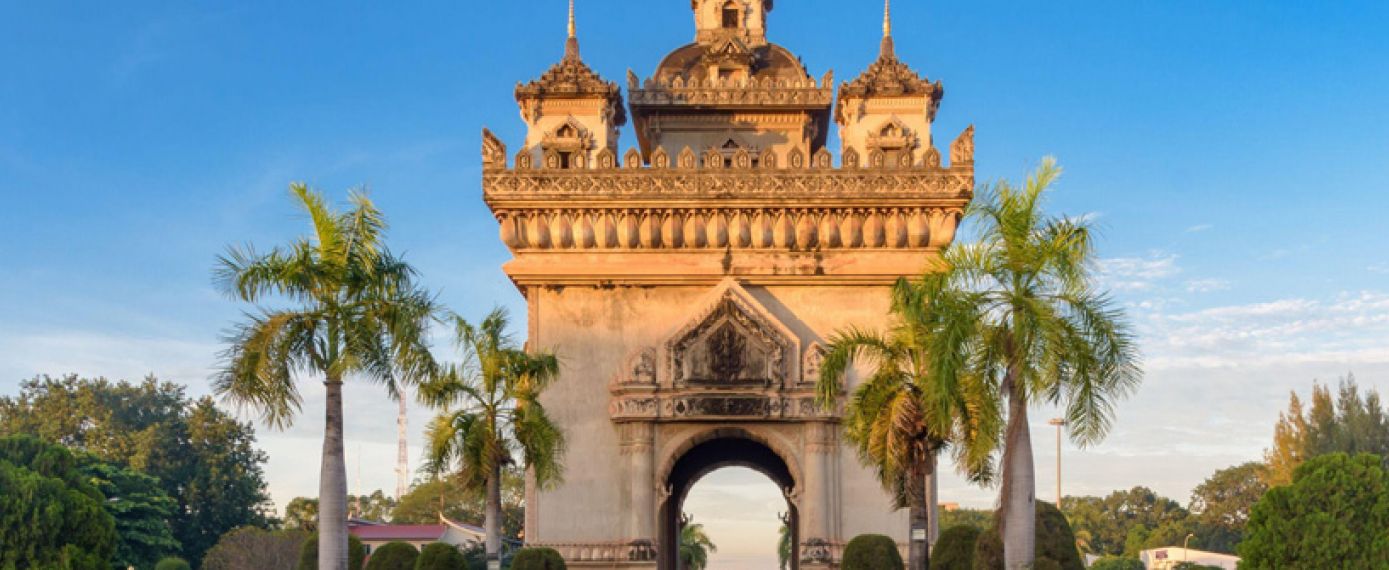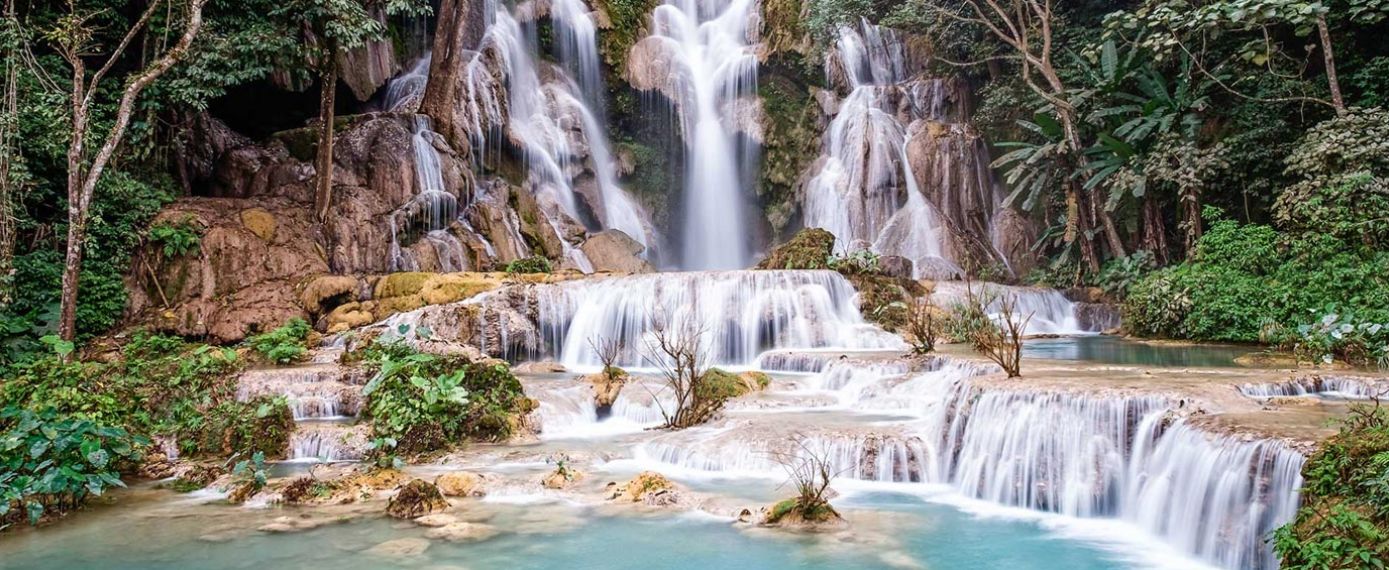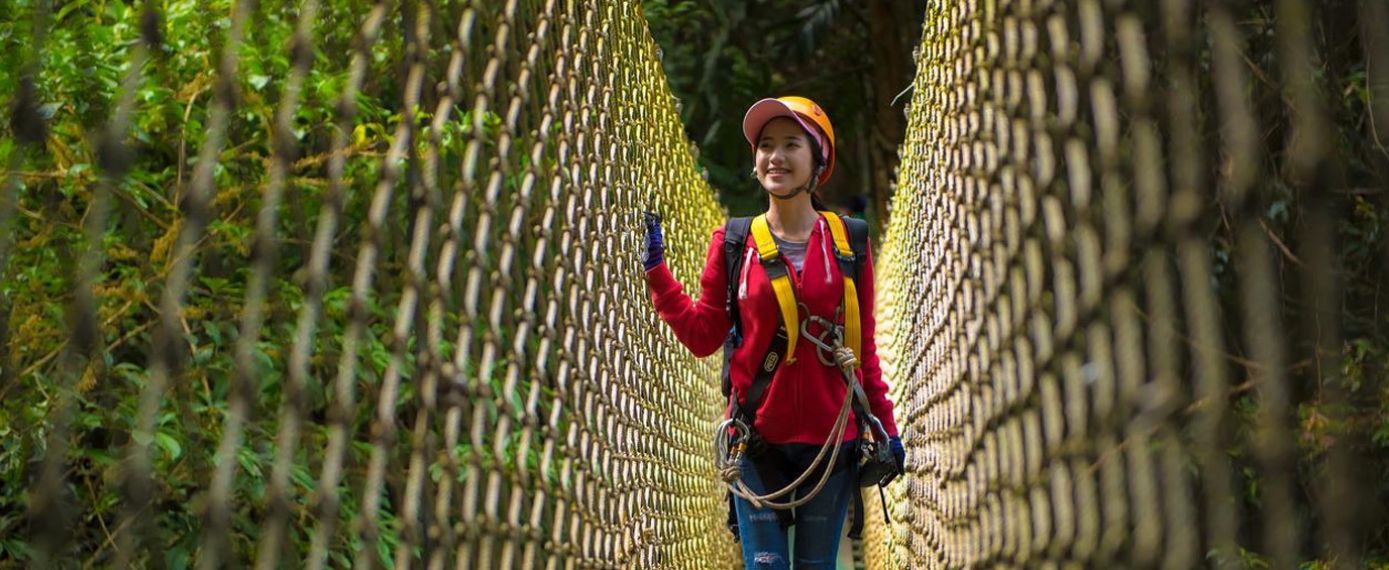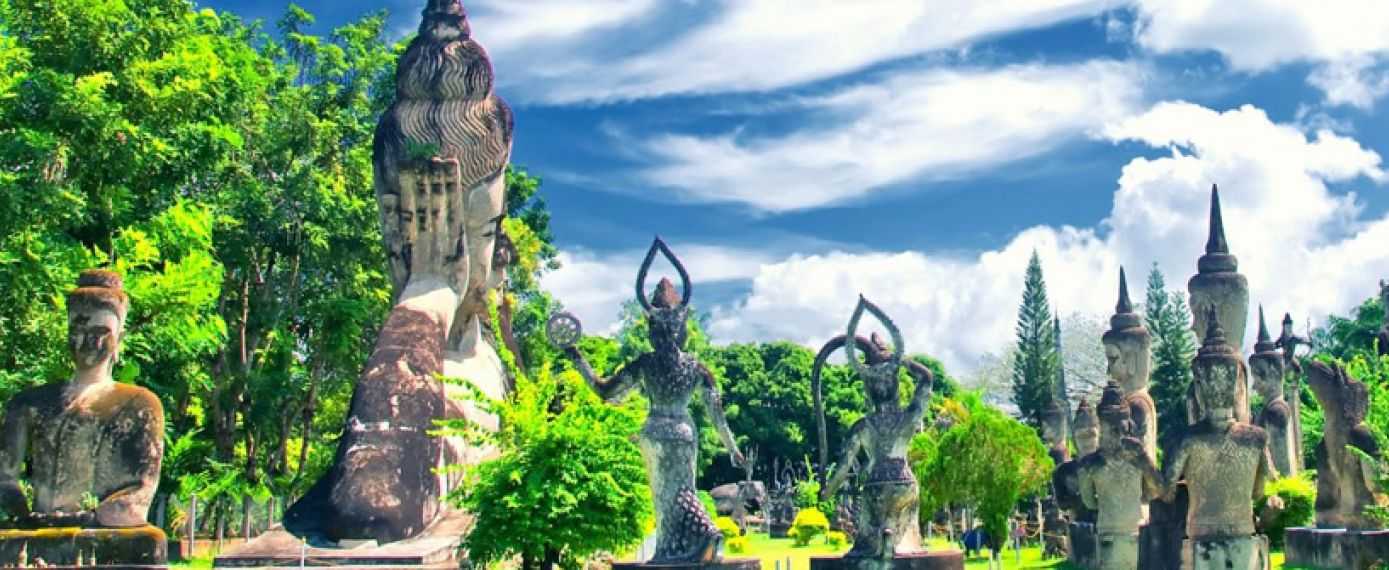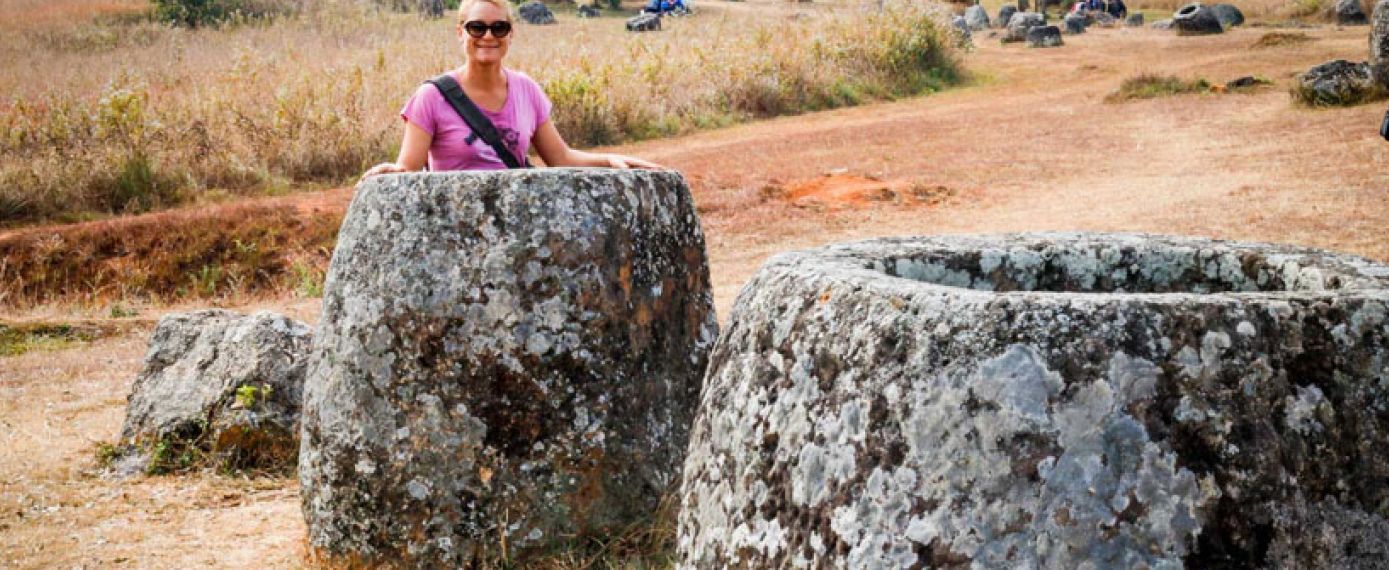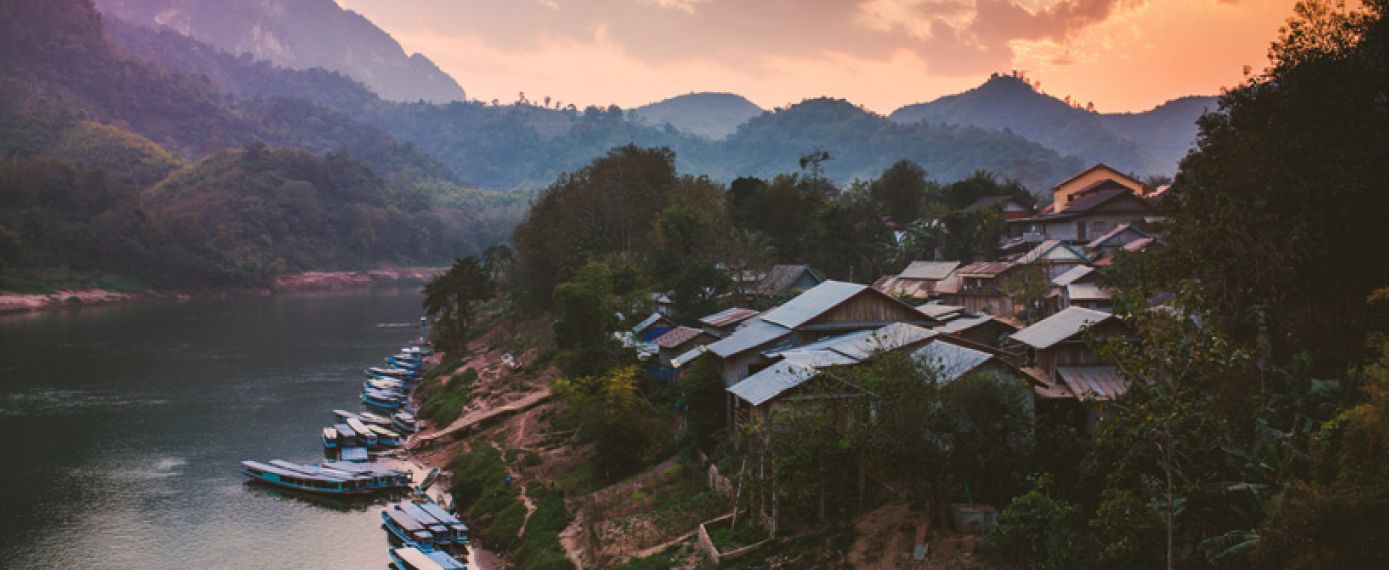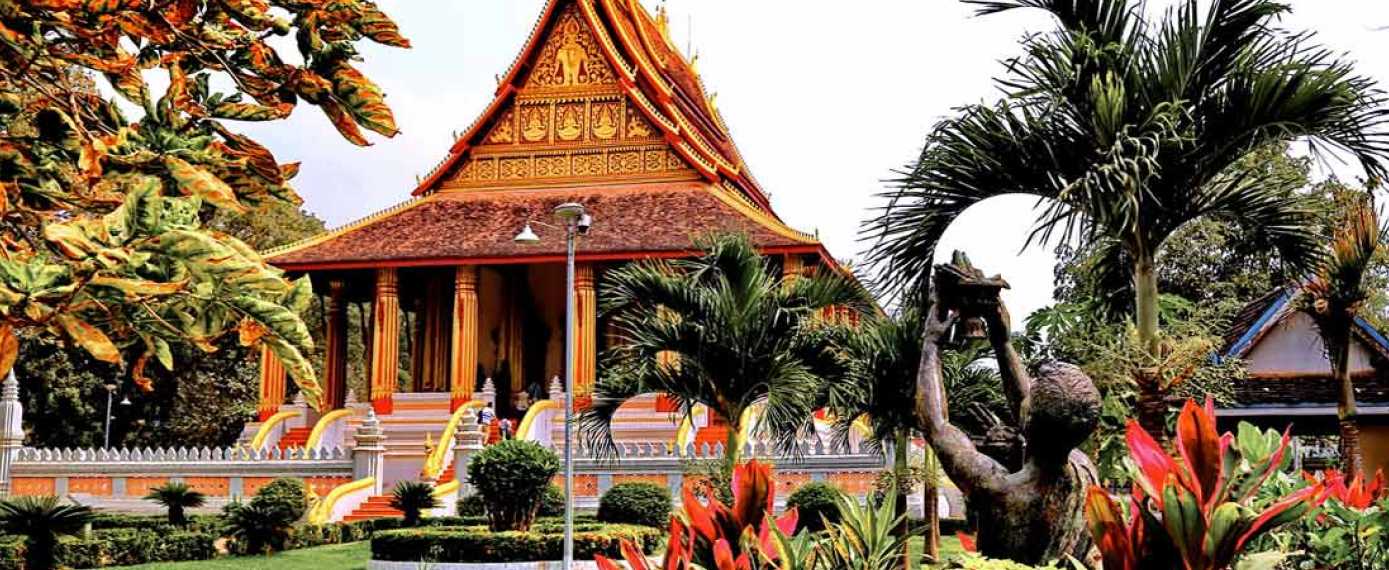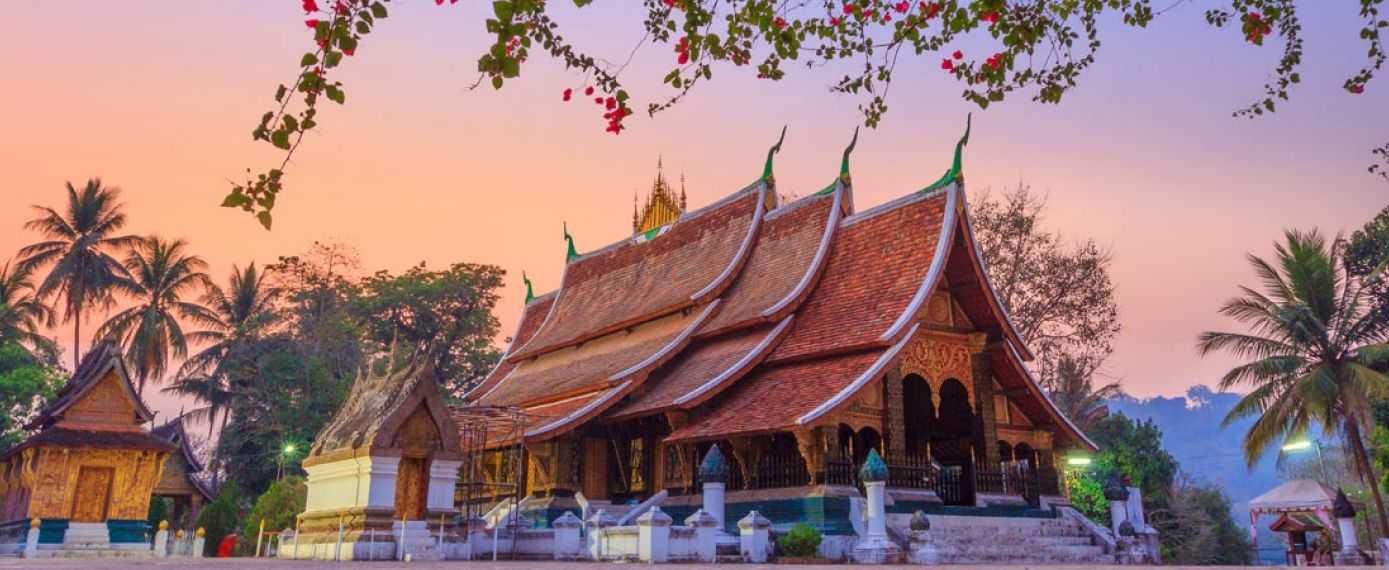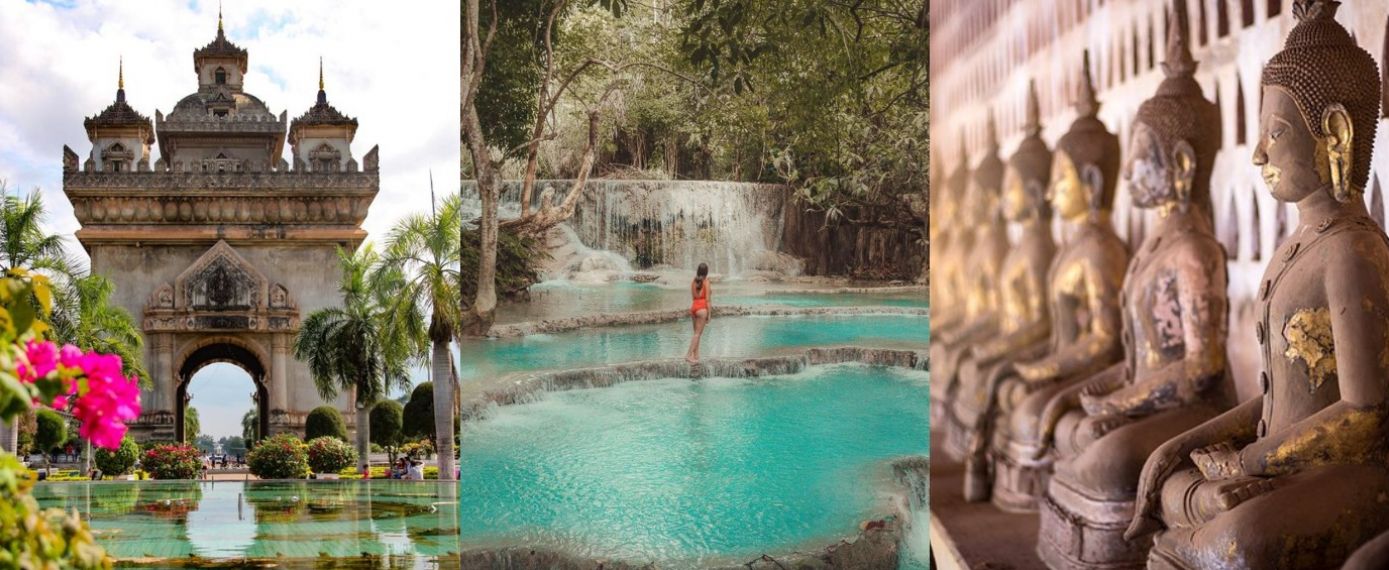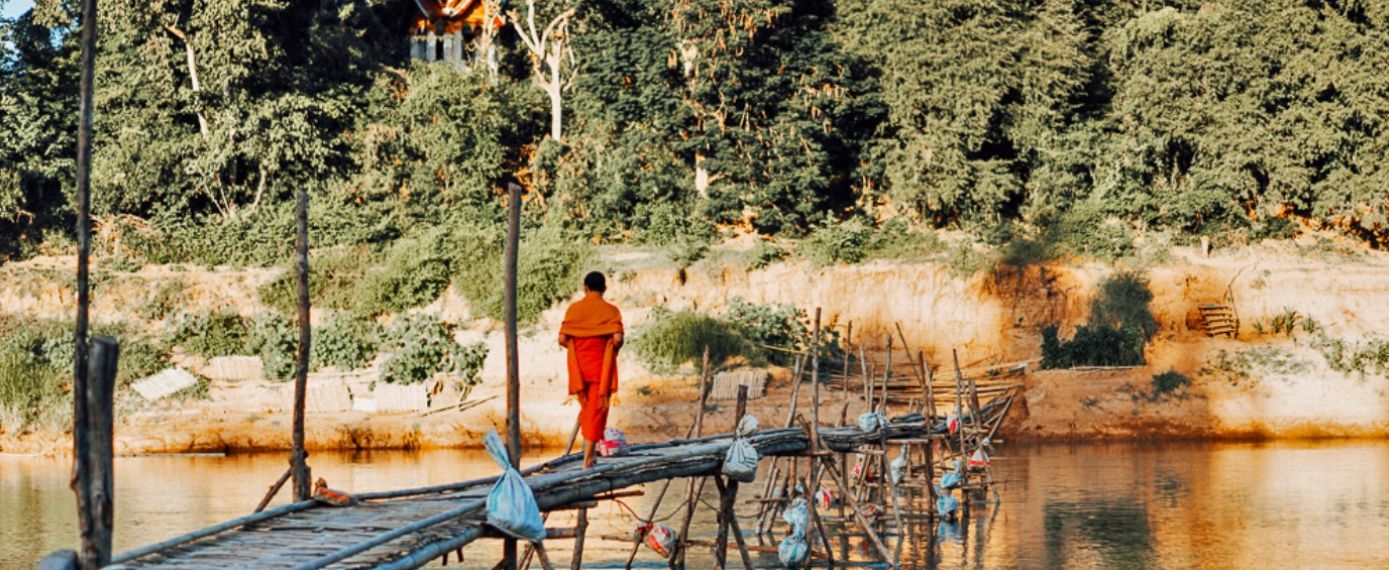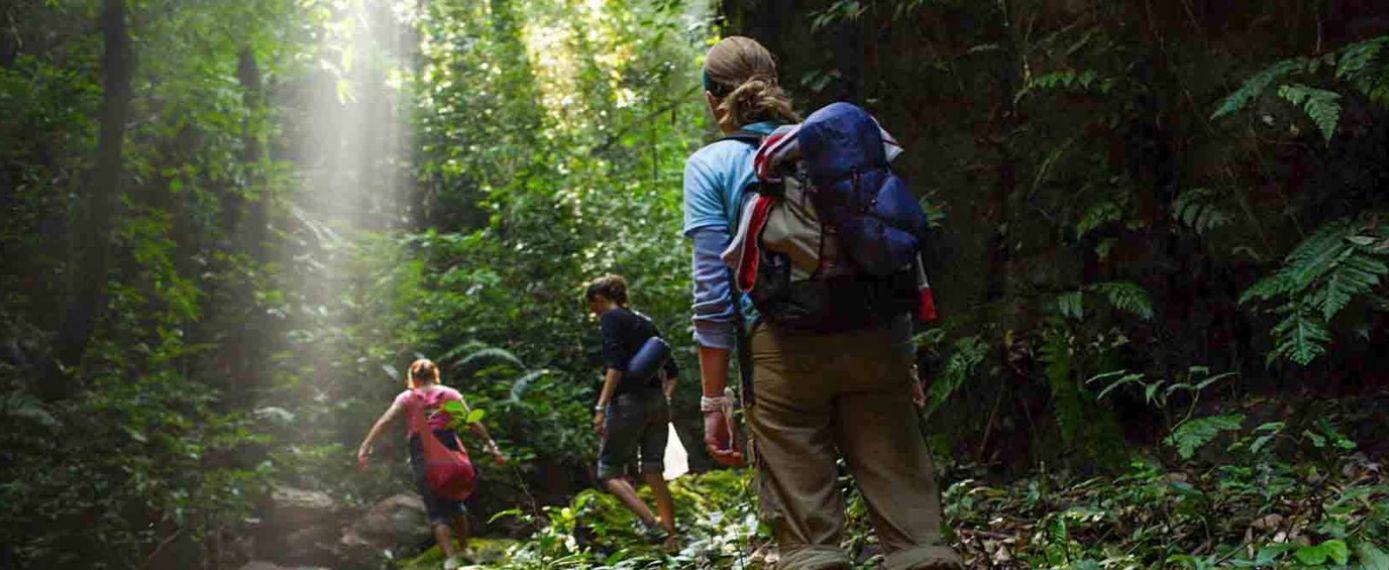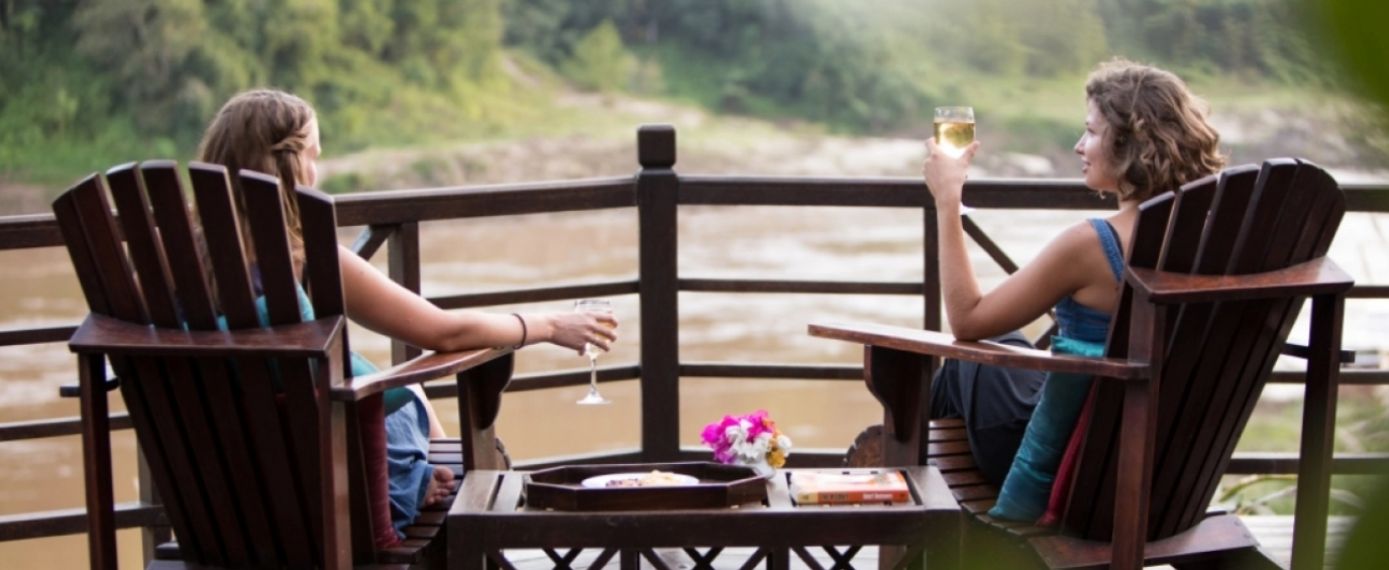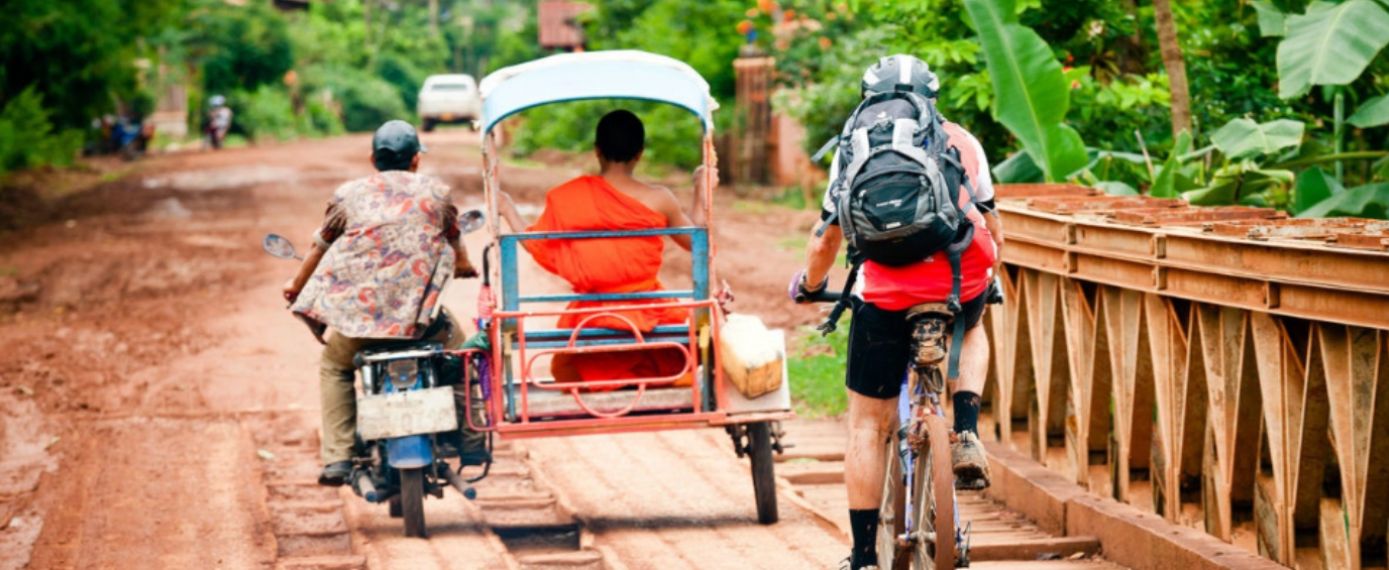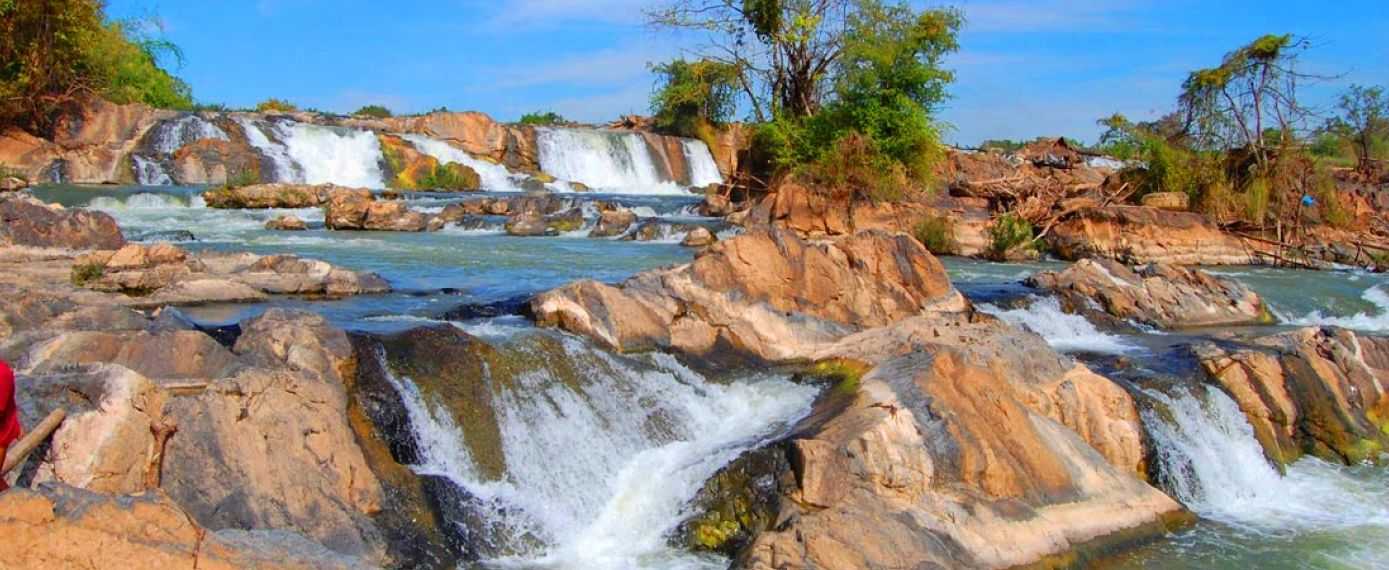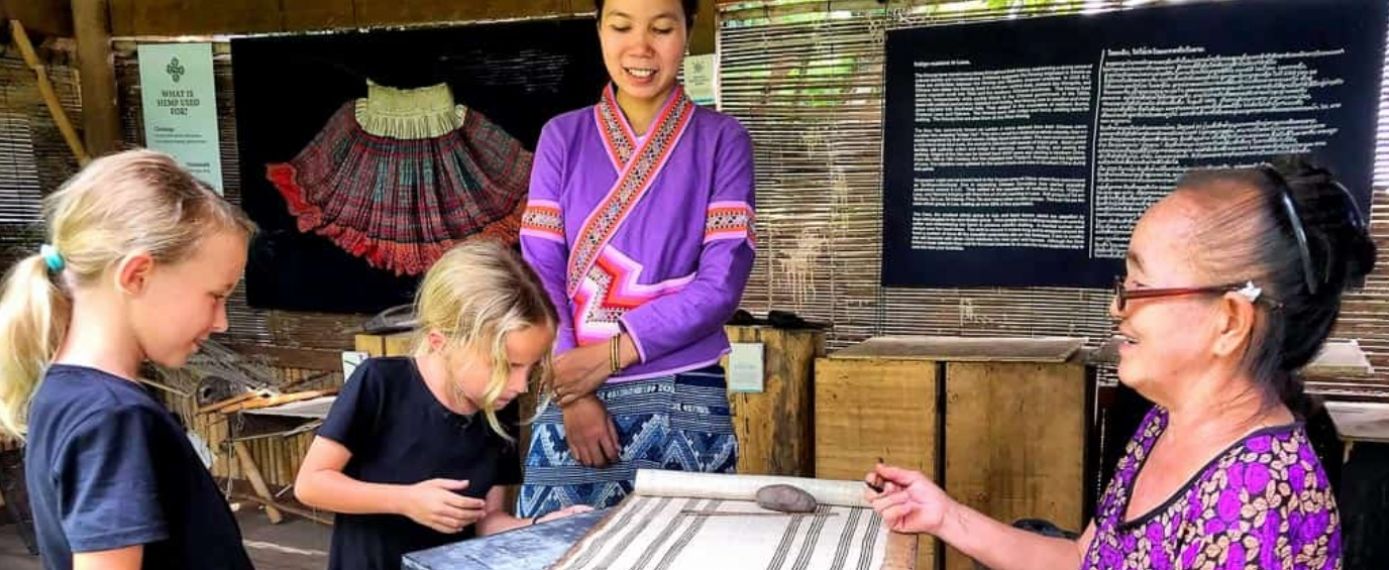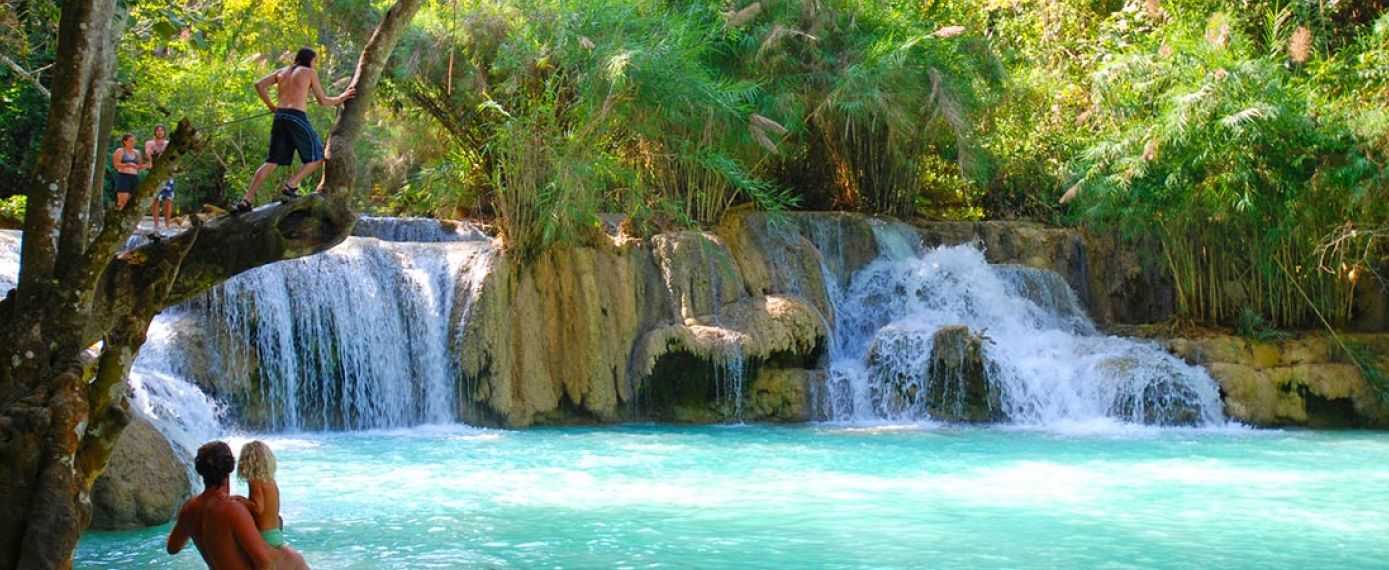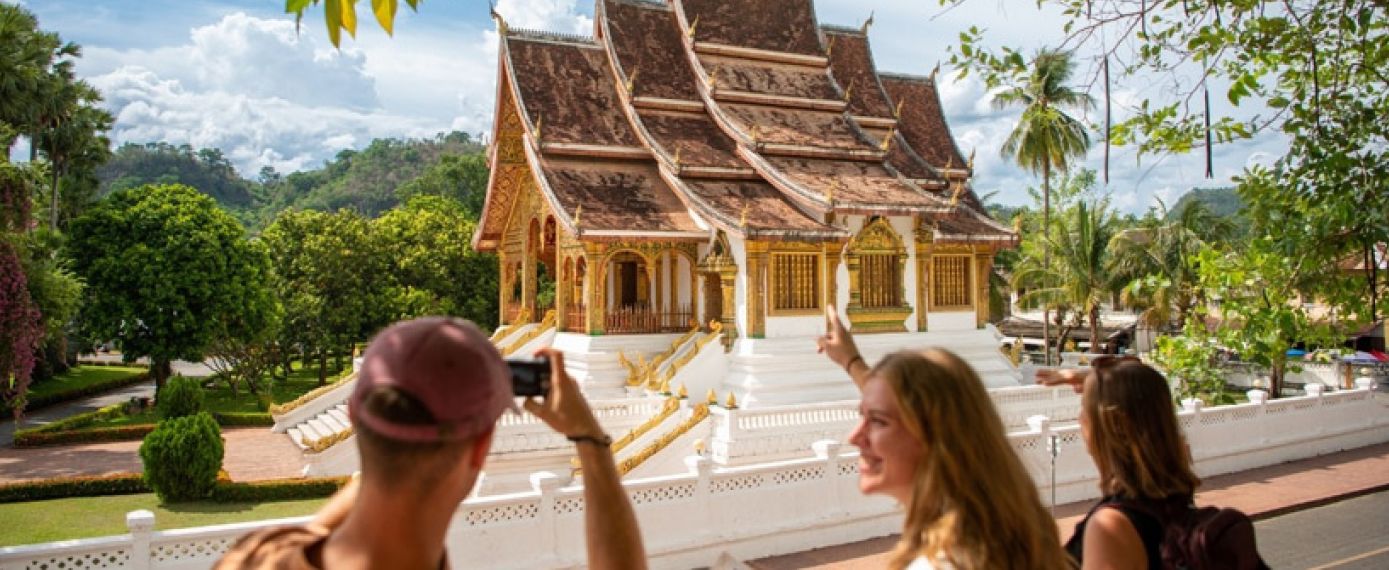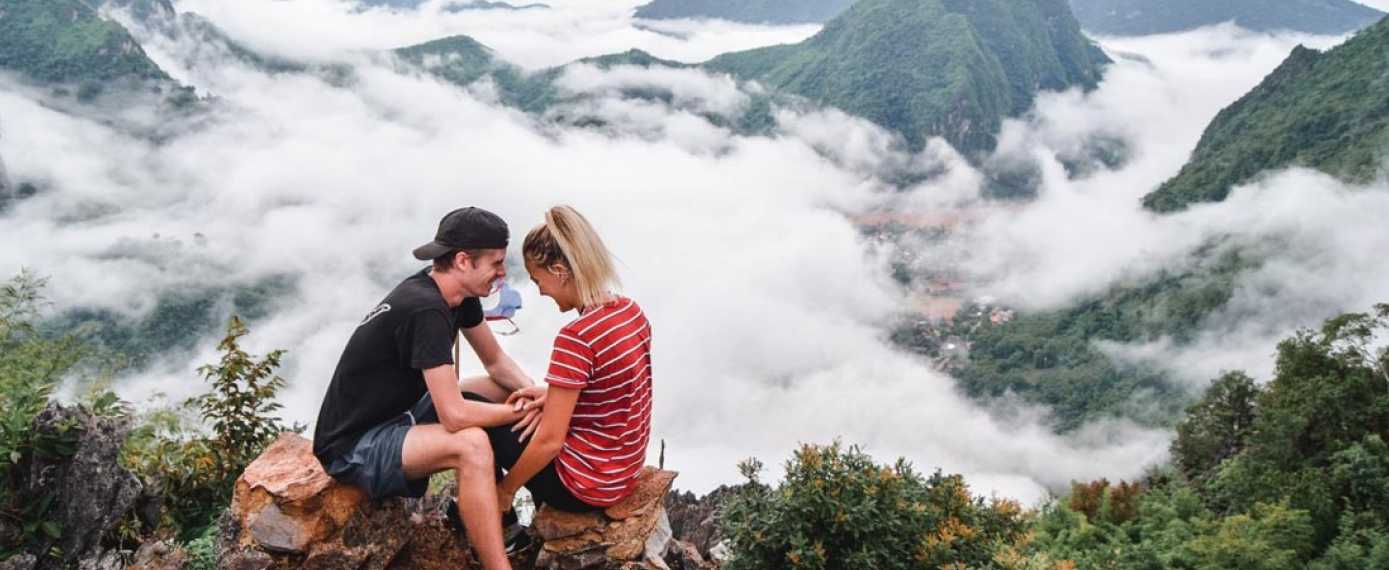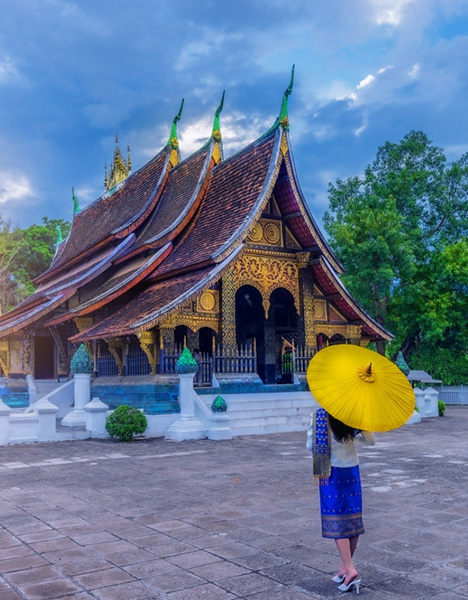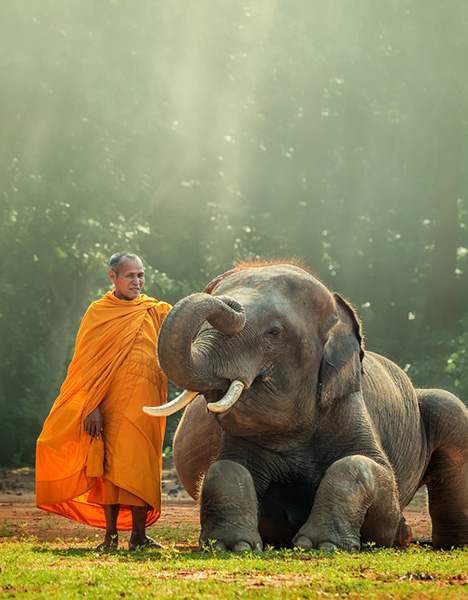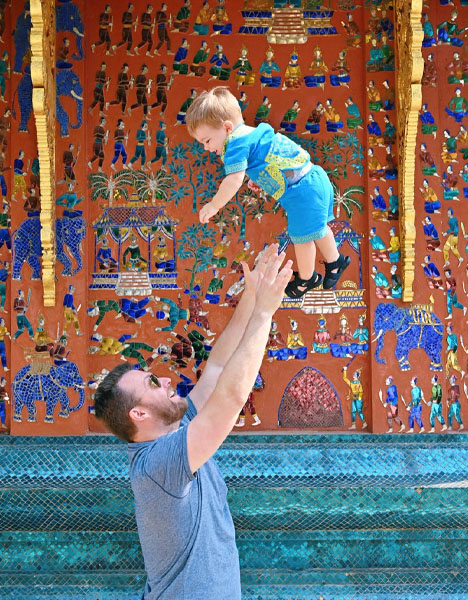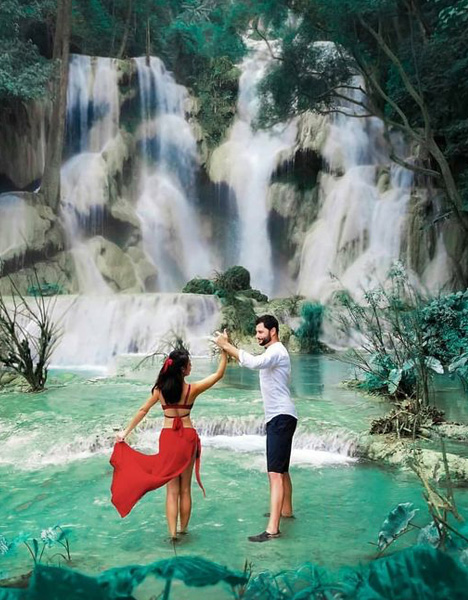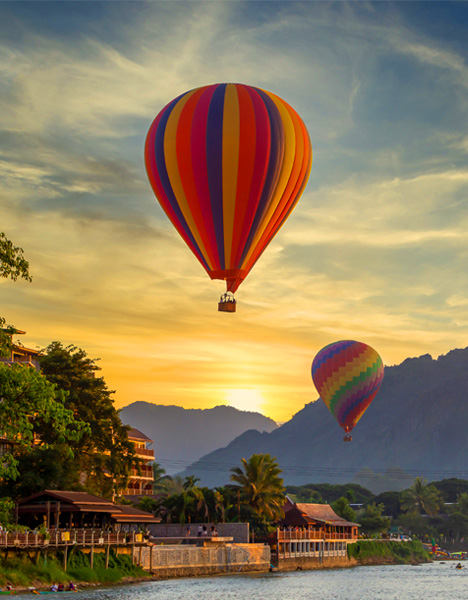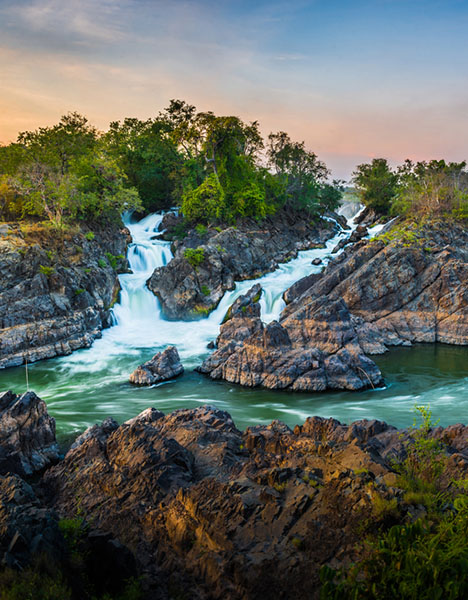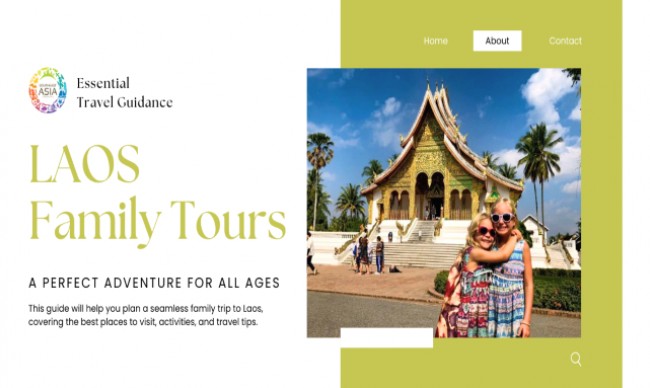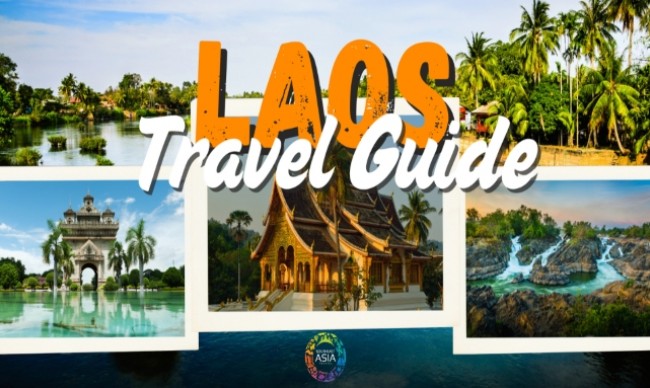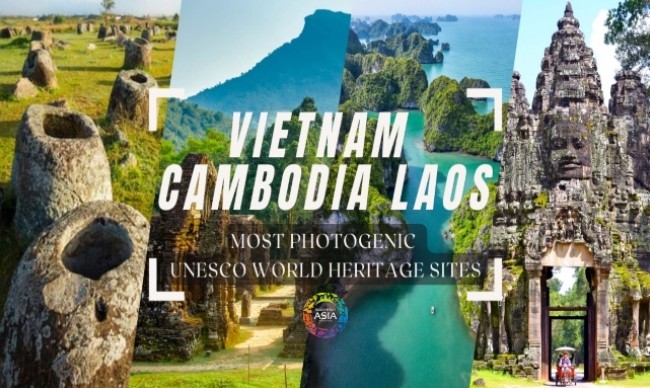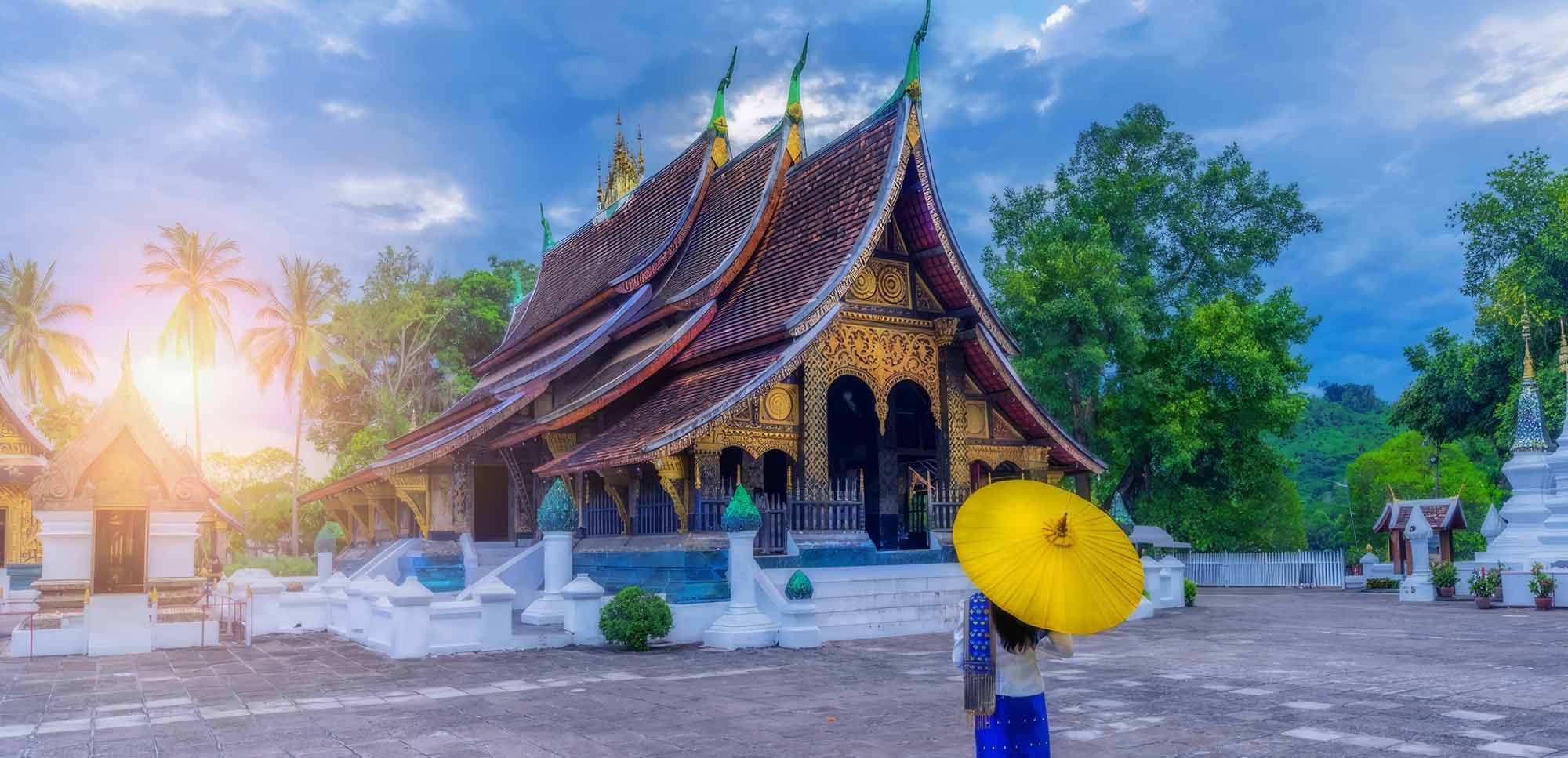
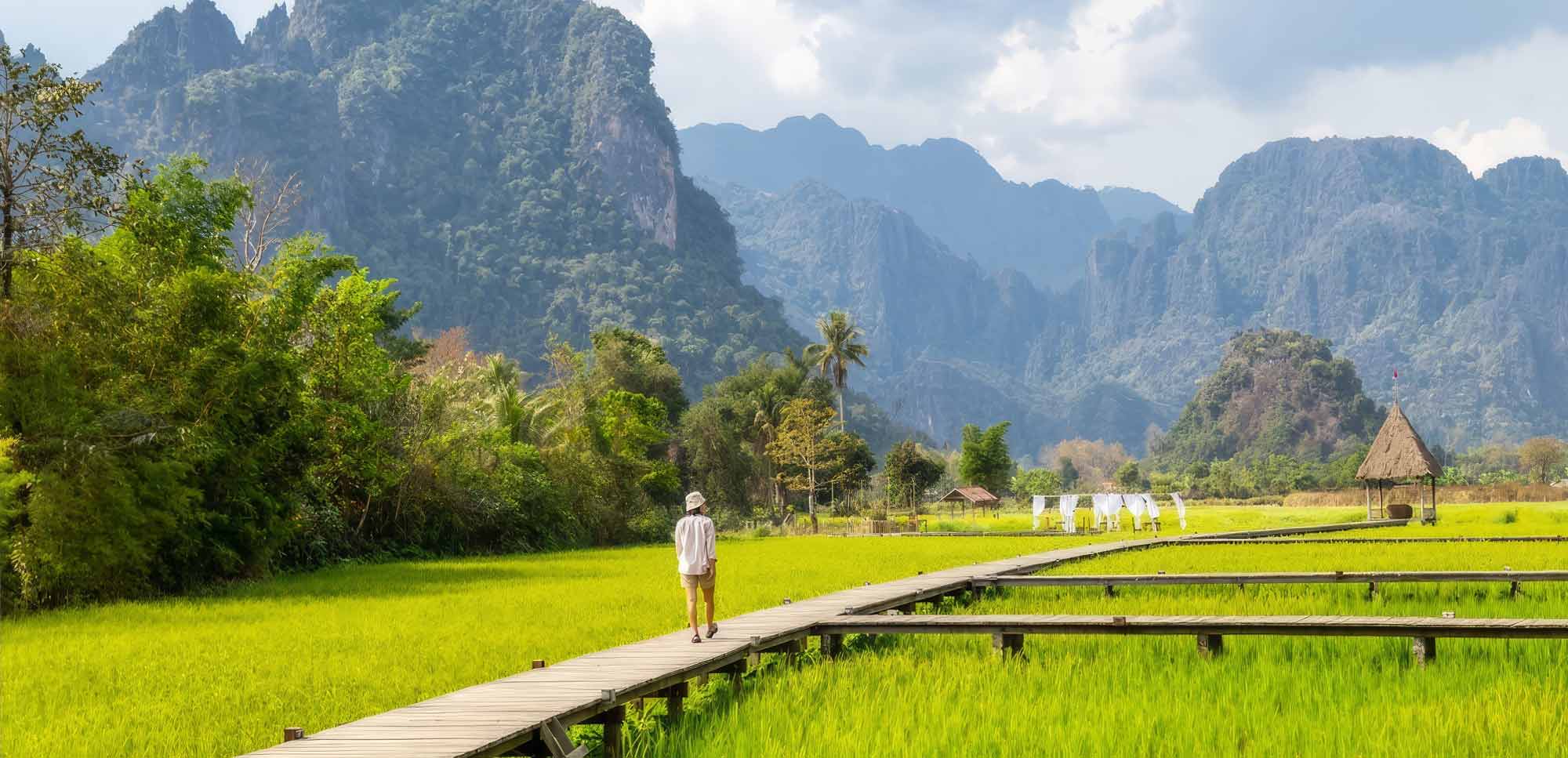
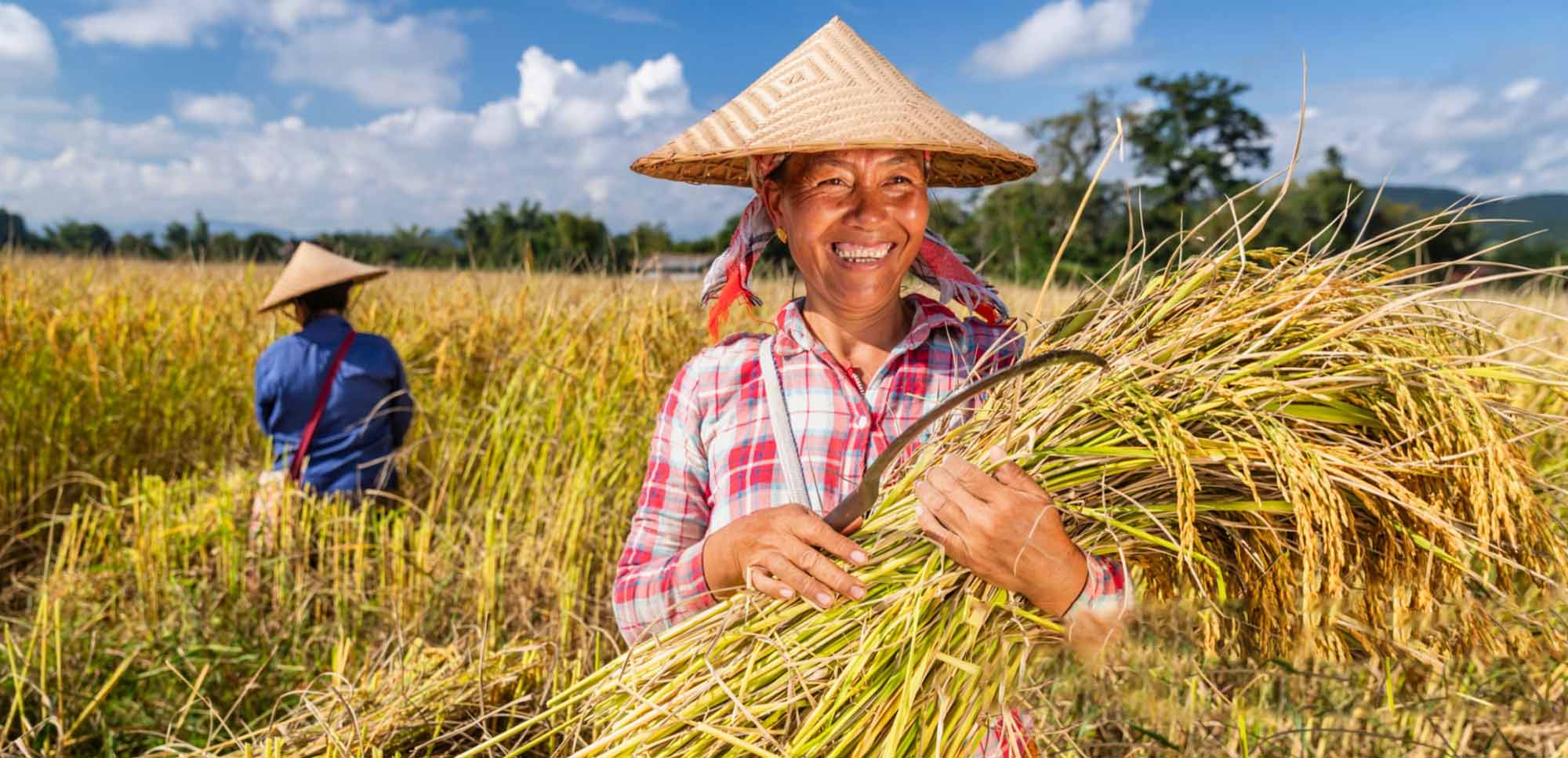
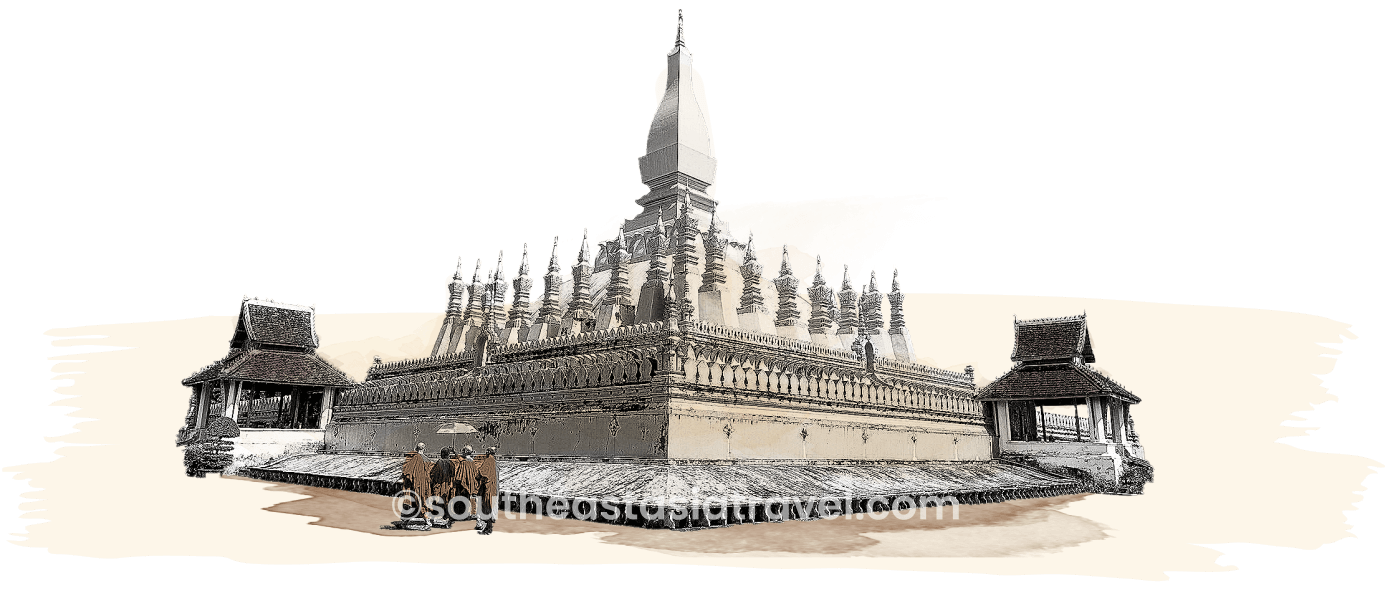
Highlights of Laos Tours
Soak up the slower pace of life in the UNESCO Heritage Site Luang Prabang, the famous destination of "the land of a million elephants." This engaging former royal capital is cocooned in jungle-draped mountains where the Mekong and Nam Khan rivers meet. Wandering the Old Town streets, past ancient Buddhist temples and ochre-painted colonial houses, seeing saffron-robed monks collecting alms at dawn, and enjoying the gentle bustle of the sprawling night market are the must-do things in Luang Prabang. Venture further with a laidback cruise along the palm-fringed Mekong, past sleepy hamlets and waterfront gardens, to the Pak Ou Caves, packed with thousands of miniature wooden statues of Buddha. A short drive away, hidden within the forest, there are watery pleasures to savor at the Kuang Si Falls, where you can wander a network of nature trails between refreshing dips in crystal-clear pools.
As the smallest capital in Southeast Asia, Vientiane has a cosmopolitan feel, with palm-shaded streets dotted around by ancient ruins, gleaming stupas, and graceful colonial buildings. Further to Xiangkhouang province in the north, there is the Plain of Jars, a mysterious archaeological site that presents ancient stone jars scattered across the landscape, whose origins are shrouded in intrigue and legend. This unique destination offers an intriguing glimpse into Laos' ancient past. Still wild and largely untouched by the morden life, Laos certainly is the off-the-beaten-path destination of Southeast Asia.
Read more ...
Laos Tours
What are Laos Tours?
Laos, officially the Lao People's Democratic Republic, is a landlocked country in Southeast Asia, known for its lush landscapes, rich culture, and serene atmosphere. The Mekong River, a lifeline for the country, flows through its terrain of mountains, forests, and plains. Often called the "Land of a Million Elephants," Laos boasts a diverse cultural heritage influenced by Theravada Buddhism, visible in its ancient temples and traditional festivals.
Laos Tours are curated travel experiences that allow visitors to explore the natural beauty, cultural heritage, and serene charm of Laos. A classic Laos tour often includes visits to iconic destinations like Luang Prabang, a UNESCO World Heritage Site known for its ancient temples and vibrant night markets, and Vientiane, the capital city with its blend of historic landmarks and modern influences. Adventure tours offer moderate treks through jungles, kayaking excursions along the Mekong River, and exploration of hidden caves. Cultural tours provide insights into traditional Lao lifestyles, Buddhism, and local crafts, making Laos tours a perfect blend of relaxation, discovery, and adventure.

When planning a trip to Laos, visitors often choose between Laos group tours and Laos private tours, each offering unique benefits and drawbacks. If Laos group tours suit those looking for affordability and social interaction, Laos private tours are ideal for those seeking a personalized and flexible experience. Understanding these options can help travelers select the experience best suited to their preferences and needs.
Laos Private Tours
Laos Private Tours are personalized travel experiences designed for individuals, couples, or small groups, offering exclusive itineraries tailored to specific interests and preferences. These tours provide flexibility in scheduling, private transportation, and dedicated guides, ensuring a more intimate and customized exploration of Laos' cultural and natural attractions.
Advantages of Laos Private Tours:
Customizable Itineraries: Laos private tours allow travelers to design their own schedules, focusing on destinations and activities that align with their interests.
Personalized Attention: Guides in private tours provide dedicated attention, offering in-depth insights and accommodating specific needs.
Flexible Pacing: Travelers can spend more time at preferred locations and adjust plans on the go, making for a relaxed and tailored experience.
Privacy and Comfort: Laos private tours cater to small groups or individuals, offering an intimate experience away from crowds.
Disadvantages of Laos Private Tours:
Higher Cost: Private tours are commonly more expensive because of the exclusivity and personalized services offered.
Limited Social Interaction: Travelers on private tours may miss the opportunity to connect with a diverse group of people, which can enhance the travel experience for some.
Laos Group Tours
Laos Group Tours are pre-organized travel experiences where participants join a larger group to explore the country's attractions together. These tours follow fixed itineraries, are led by professional guides, and are cost-effective, offering shared transportation, accommodation, and activities while fostering social interaction among travelers.
Advantages of Laos Group Tours:
Cost-Efficient: Group tours are generally more affordable, as costs, such as transportation, guides, and accommodation, are shared among participants, which makes them a great choice for budget-conscious travelers.
Social Experience: Group tours provide opportunities to meet and interact with fellow travelers from around the world, fostering a sense of camaraderie and shared adventure.
Pre-Planned Itineraries: These tours offer structured schedules, eliminating the need for extensive trip planning. Participants can relax and follow a well-organized itinerary designed by experts.
Disadvantages of Laos Group Tours:
Lack of Flexibility: Group tours stick to fixed itineraries, leaving little room for personal preferences or spontaneous changes.
Time Constraints: Travelers may feel rushed as group tours typically allocate limited time at each destination to accommodate the schedule.
Group Dynamics: The experience may be influenced by the attitudes and behaviors of fellow participants, which could impact enjoyment.
Less Personalized: The large group size may limit individual interaction with guides and reduce the opportunity for tailored experiences.
Why choose Laos Tours?
Pristine Natural Beauty
Laos is celebrated for its pristine natural beauty, featuring lush forests, stunning waterfalls, and tranquil rivers. In the north, dense forests, cascading waterfalls, and vibrant hill tribe villages create a picturesque backdrop, while the idyllic 4,000 Islands (Si Phan Don) in the south offer tranquil views of palm-fringed islands and gentle rivers. Iconic spots like the crystal-clear waters of Kuang Si Falls and the limestone karsts of Vang Vieng offer breathtaking vistas, while the Mekong River flows through the heart of the nation, providing a picturesque setting for rural life. With its untouched wilderness and diverse ecosystems, Laos is a haven for nature lovers and adventurers alike.
Rich Cultural Heritage In Laos
Laos boasts a rich cultural heritage shaped by centuries of Buddhist tradition, animistic beliefs, and diverse ethnic groups. Its heritage is reflected in the ornate temples, vibrant festivals, and traditional arts such as Lao silk weaving and wooden carving. The influence of Buddhism is evident in the country's many stunning stupas and monasteries, with That Luang and Wat Si Saket being key examples. Local customs, such as the Baci ceremony and the Pi Mai Lao (Lao New Year), highlight the deep-rooted sense of community and respect for ancestors. The country’s cultural diversity, with more than 49 ethnic groups, further enriches Laos, making it a fascinating blend of ancient traditions and living heritage.
Laotians Are Warm And Welcoming People.
Laotians are known for their warmth, hospitality, and welcoming nature. Visitors to Laos often find themselves greeted with genuine smiles and open arms, as the culture places great value on kindness, respect, and community. Whether in bustling cities or remote villages, locals are eager to share their traditions, offer help, or invite travelers to join in meals and celebrations. This friendliness is deeply rooted in the Lao concept of "khony pen khon" (we are all one family), reflecting a sense of unity and care for others that makes Laos a truly inviting place for people from all walks of life.
Delicious Cuisine
Laos is home to a delicious and diverse cuisine that reflects its rich cultural heritage and the natural abundance of the region. Known for its bold flavors, Lao food is a balance of spicy, sour, salty, and sweet, with fresh ingredients like herbs, chilies, fish sauce, and lime. Staples like khao niew (sticky rice) and laap (minced meat salad) are often served alongside flavorful dishes such as tam mak hoong (papaya salad) and khao poon (spicy noodle soup). Street food, including grilled meats and savory snacks, adds to the country's culinary appeal. Laos’ cuisine is simple yet bursting with fresh, vibrant flavors, making it a true delight for food lovers.
Laos Is Unspoiled By Mass Tourism.
Laos remains largely unspoiled by mass tourism, offering a more authentic and tranquil experience compared to many other Southeast Asian destinations. With its serene landscapes, rich traditions, and warm, welcoming locals, the country retains a sense of untouched beauty and cultural integrity. Unlike bustling tourist hotspots, Laos allows visitors to explore its natural wonders and vibrant communities at a leisurely pace, often away from the crowds. This peaceful charm makes Laos an ideal destination for travelers seeking an off-the-beaten-path adventure, where the essence of the country is still preserved in its landscapes, villages, and way of life.
Laos Is An Affordable Travel Destination.
Laos is an excellent destination for budget travelers. Accommodation, food, and transportation are all reasonably priced, with budget-friendly options available in both cities and rural areas. Street food and local eateries provide delicious, inexpensive meals, while guesthouses and small hotels offer comfortable stays at low rates. Whether you're exploring the temples of Luang Prabang, trekking in the northern highlands, or enjoying the beauty of the 4,000 Islands, Laos offers a memorable travel experience that is both affordable and rewarding.

Best time to take Laos Tours
Planning a visit to Laos requires consideration of its tropical monsoon climate, which significantly influences travel experiences. Here's a guide to help you choose the best time to explore this enchanting country.
Dry Season (November to April) - The Prime Time
The dry season, particularly from November to February, is the most popular time to visit Laos. During these months, the weather is cool and pleasant, with daytime temperatures ranging from 15°C to 30°C (59°F to 86°F). This is ideal for outdoor activities like trekking in Luang Prabang, exploring the ancient temples of Vientiane, or cruising along the Mekong River.
In March and April, temperatures start to rise, often reaching over 35°C (95°F), but the landscapes remain stunning, and this is an excellent time for river adventures and cultural festivals like Pi Mai Lao (Lao New Year) in April.
Wet Season (May to October) - A Time for Lush Beauty
The wet season brings heavy rains, especially from June to August. While travel can be challenging due to muddy roads and occasional flooding, this period has its own charm. The countryside transforms into a vivid green, and waterfalls like the Kuang Si near Luang Prabang become even more spectacular.
The rain usually falls in short, intense bursts, leaving plenty of time to explore between showers. Fewer tourists mean quieter attractions and more opportunities to enjoy Laos’ serene ambiance. October, at the tail end of the rainy season, is particularly appealing as the weather begins to improve, and the landscapes are still lush.
Shoulder Seasons - Balancing Weather and Crowds
Late October and early November, as well as late February to early March, are excellent times to visit. There is a balance between good weather and fewer crowds throughout these months. You'll enjoy clear skies, manageable temperatures, and the best of both the dry and wet seasons.
What you can expect from Laos Tours
- Bask in the peaceful, relaxed vibe of Vientiane and get a hassle-free introduction to its famous historic landmarks and ancient artworks through possible stops like Wat Sisaket, Haw Phra Kaew, Pha That Luang, COPE Museum, and Buddha Park.
- Visit well-known temples and museums to experience the enchanting ambiance of the exquisitely maintained historic town of Luang Prabang: Wat Visoun, Wat Xiengthong, Wat Mai, Wat Aham, Royal Palace Museum…
- Cool off in the refreshing turquoise pools of the three-layered Kuang Si Waterfalls, walk the green trails of the nature reserve, visit the bear rescue center, and stop at rural villages for a look at a more traditional way of life.
- Embark on a leisurely cruise upstream on the Mekong River, pass by waterfront villages, and visit the mysterious Pak Ou Caves, an important religious site for locals in Luang Prabang famous for thousands of Buddha statues on display.
- Delve deeper into the culinary culture of Laos during a hands-on cooking class in Luang Prabang, learn about local herbs and produce in a local market, work alongside local chefs to cook traditional dishes, and sample your creations.
- Marvel at the impressive UNESCO World Heritage Site of Wat Phou, a remarkably preserved pre-Angkorian temple in the countryside of Southern Laos and one of the oldest worshipping places in Southeast Asia.
- Indulge in the cool temperatures and lush landscapes of the Bolaven Plateau, a wonderful destination for nature lovers in southern Laos with magnificent waterfalls, coffee plantations, and ethnic minority villages.
- Take part in a thrilling adventure along the Nam Ou River with many intriguing experiences, such as cruising and kayaking on the river, trekking through lush forests and paddy fields, and visiting ethnic villages.
- Visit the mysterious UNESCO-listed Plain of Jars in the Xieng Khouang Plateau, one of the most important prehistoric sites in Southeast Asia, which is famous for thousands of stone jars in various sizes and shapes.
- Board a local boat cruising through the peaceful and untouched landscape of the 4000 islands' region to visit spectacular waterfalls and explore the authentic beauty of local life in the island villages.
- Paddle down the Nam Song River through small but fun rapids and experience the beautiful scenery of Vang Vieng, including limestone cliffs, rice paddies, and traditional villages while gently kayaking down the river.
- Cruise upstream the Nam Ou River from Nong Khiaw through stretches of wild jungle and high mountains to Muang Ngoy to experience a guesthouse stay and join a light trekking adventure through ethnic villages.
- Embark on a traditional boat trip from Houay Xai to Pak Beng with some stops at local traditional villages, where you can observe rural life along the Mekong and see the talented craftsmanship of ethnic minorities.
- Trek along small green trails of Muang La to experience the unspoiled beauty of rural Laos, and explore isolated waterfalls and surrounding hill tribe settlements where local life is unhurried and mainly traditional.
- Partake in a one-day trek and unleash your inner explorer in the mostly forested Nam Ha National Protected Area as you hike amongst the huge old trees, encounter diverse wildlife, visit remote villages, and explore the rhythm of jungle living.
- Discover another life amidst the protected rainforest of Nam Kat Yorla Pa as you hike over lush vegetation and limestone outcrops on suspended mesh bridges to the stunning tiered Nam Kat waterfall for a refreshing dip in the natural pools.

Most Popular Destinations on Laos Tours
Vientiane
Laos was once a French colony, and the French influence is still evident in its capital, both in the cuisine and architecture. The boulevard along the Mekong River is a great place to stroll with lots of charming restaurants, cafes, and a huge, lively night market. While Vientiane’s beauty and allure are less readily evident than those of other historic cities in the region, it has a few enchanting secrets up its sleeve that are well worth exploring.
Luang Prabang
Luang Prabang is a historic city that once served as the capital of the Kingdom of Laos. At the meeting point of the Mekong and Nam Khan rivers, this town stands in front of a backdrop of a magnificent hilltop temple. Luang Prabang is perhaps one of Indochina’s most alluring towns. Very walkable-friendly, it is wrapped in an uncommon peace and spirituality that reaches well beyond its over three dozen Buddhist temples.
The Thakhek Loop
Located in central Laos, this quiet town offers a 450 km motorbike loop through some of the most beautiful and remote parts of the country, including the massive Kong Lor Caves and the Buddha Cave. The journey can take between two to four days depending on the number of stops and the route, starting and ending at Thakhek town. The improved quality of the roads means even novice riders will enjoy the ride.
Nong Khiaw
If you are interested in nature or adventure, this is one of the best places to visit in Laos. The area has some amazing treks and cycle routes around the scenic villages surrounding the main town. Nong Khiaw is also on the banks of the delightful Nam Ou River, so a boat trip is a great way to experience the area.
Muang Ngoi
Muang Ngoi is a beautiful small town in northern Laos, accessible by boat from Nong Khiaw. This remote river village is ideal for those who want to immerse themselves in authentic, peaceful life. The surrounding unspoiled natural area has caves, is great for adventurous treks and kayaking, and its panoramic views make it one of the most beautiful places in Laos.
Vang Vieng
Vang Vieng is the premier destination for outdoor adventure – perfect for those who want to go caving, climbing, and kayaking. The town is sandwiched between these karst cliffs and the palm-fringed river, and it’s simply one of the most picturesque spots in Southeast Asia. Even if adventure isn’t your thing, relaxing on the banks of the Song River or strolling through the sleepy nearby town is a charming respite from reality.
Si Phan Don
Si Phan Don is a series of various-sized islands dotted along the Mekong River in southern Laos - most are very small and uninhabited. The biggest and most popular islands are Don Det and Don Khong. They have a very laid-back atmosphere and are very easy to explore by bicycle, passing by paddy fields, villages, and beautiful waterfalls. You might even be lucky enough to spot some Irrawaddy dolphins.
Pakse
Located in the confluence of the Se Done and Mekong rivers, Pakse is the most important economic and tourism center of southern Laos. It is also the perfect base for exploring the famous Bolaven Plateau. This is a stunning park with numerous waterfalls and coffee and tea plantations, making it one of the most beautiful places in Laos. You can visit the Bolaven Plateau as part of an organized tour or by renting a scooter or tuk-tuk.
Phonsavan
This unique area is one of the cultural highlights of Laos. The main attraction is its megalithic archaeological landscape, formed of thousands of stone, jar-like structures dotted about the valleys. Believed to have been used as graves or to store rice wine, the remains of these mysterious stone jars are one of the most famous prehistoric sites in Southeast Asia.
Huay Xai
Huay Xai is a small village on the Mekong River in Laos. It is a popular place for boat tours, trekking to traditional mountain communities, and homestay experiences. The most famous nearby attraction is Bokeo Nature Reserve, known for its spectacular gibbon experience. The forests are home to some of the last remaining groups of black-cheeked gibbons in Laos, and travelers can support conservation as well as have an opportunity to see these animals in their natural habitat.
Laos Tours by Styles
Laos Tours by Styles are customized travel experiences in Laos, organized based on specific themes or interests. These tours cater to diverse preferences, such as adventure, culture, nature, or family-friendly itineraries, allowing travelers to explore Laos in a way that best suits their needs and passions.
Heritage & Culture Laos Tours
Heritage & Culture Laos Tours are specialized travel experiences designed to immerse travelers in the rich cultural and historical heritage of Laos. These tours typically take you to ancient temples, UNESCO World Heritage Sites like Luang Prabang, traditional villages, local markets, and cultural performances, offering a deep understanding of the country's traditions, history, and way of life.
Laos Nature & Wildlife Tours
Laos Nature & Wildlife Tours are curated tour packages focused on exploring the country's stunning natural landscapes and diverse wildlife. These tours often include activities such as trekking through lush jungles, visiting national parks, exploring waterfalls and caves, and spotting native wildlife in their natural habitats, providing an eco-friendly and immersive way to experience Laos' pristine environment.
Adventure & Outdoor Laos Tours
Adventure & Outdoor Laos Tours are action-packed travel experiences created for thrill-seekers and outdoor enthusiasts. These tours often feature activities such as trekking, kayaking, boating, and biking, allowing travelers to discover Laos' rugged terrain, scenic rivers, and remote landscapes while enjoying an adrenaline-filled journey.
Laos Beach & Island Tours
Laos Beach & Island Tours focus on exploring the serene riverine beaches and islands along the Mekong River, as Laos is a landlocked country without coastal beaches. These tours often highlight destinations like Si Phan Don (4,000 Islands), where travelers can relax on sandy riverbanks, enjoy boat trips, and explore the tranquil charm of island life amidst the natural beauty of the Mekong.
Laos Family Tours
Laos Family Tours are thoughtfully designed travel itineraries tailored for families, offering activities and itineraries that cater to all age groups. These tours will cover cultural explorations, nature-based adventures, and interactive experiences such as visiting local villages, uncovering waterfalls, and participating in traditional crafts, ensuring a fun, educational, and memorable trip for the whole family.
Honeymoon Laos Tours
Honeymoon Laos Tours are romantic travel experiences crafted for couples seeking a memorable and intimate getaway in Laos. These tours typically feature serene destinations, luxurious accommodations, private excursions, and activities like sunset cruises on the Mekong River, visits to tranquil temples, and scenic nature retreats, creating a perfect blend of romance, relaxation, and cultural discovery.

Where to Stay on Laos Tours
Accommodations in Laos range from charming boutique hotels and riverside resorts to eco-lodges and traditional guesthouses. In major cities like Vientiane and Luang Prabang, you'll find a mix of mid-range and luxury hotels offering modern amenities and cultural touches. For a more authentic experience, many tours include stays in rural villages, where visitors can stay with local families or in simple homestays, providing a deeper connection to Lao culture.
Vientiane
3-star Lao Orchid Hotel - Chao Anou Road, Watchan Village, Chanthabouly District, Vientiane
4-star La Seine Hotel - 160 Quai Fa Ngum, Ban Sithan Neua, Sikhottabong District N13, Vientiane
5-star Crowne Plaza Vientiane - Building A, 20 Samsenthai Road, Nongduang Nua Village, Sikhottabong District, Vientiane
Luang Prabang
3-star Sunrise Garden House - Chaotonkham Road Ban Thongchaleurn, Town Center, Luang Prabang
4-star The Belle Rive Boutique Hotel - 99 Baan Phonehueang, Luang Prabang
5-star Rosewood Luang Prabang - Ban Nadueay Village, Luang Prabang
Vang Vieng
3-star S Vangvieng Boutique Hotel - 13 East Road, Mueangxong Village, Vang Vieng
4-star Riverside Boutique Resort Vang Vieng - Ban Viengkeo, PO 360, Vang Vieng
4.5-star Tmark Resort Vangvieng - Thamjang Street, Muangsong Village, Vang Vieng
Pakse
3-star Pakse Hotel & Restaurant - No. 5 Ban Wat Luang, Pakse, Champasak Province
3.5-star Athena Hotel - 13 South Road, Phabath Village, Pakse District, Champasak Province
Si Phan Don
3-star Pon Arena Hotel - Ban Kangkong, Khong District, Muang Khong
3-star Senesothxeune Hotel - Ban Kangkong, Khong District, Muang Khong
Nong Khiaw
2-star Nong Kiau Riverside - 781 Ban Sop Houn, Nong Khiaw
3-star Mandala Ou Resort - Near Bus Station, Nong Khiaw
Oudomxay
4-star Namkat Yorla Pa Resort - Faen Village, Xay District, Oudomxay
Xieng Khouang
3-star Anoulack Khen Lao Hotel - No 059/4, Ban Phonsavanxay, Xieng Khouang
3-star Pukyo Bed And Breakfast - 55 Saylom Village, Phonsavan
Champasak
3-star Sabaidee Valley - 33rd Km, No. 16e Road, Paksong, Champasak
3-star Kingfisher Ecolodge - 1605 Pathoumphone, Ban Khiet Ngong, Champasak
4-star The River Resort - Ban Phaphinnoy, 14A Road, Champasak
Must-try Food on Laos Tours
Khao Niew - Sticky Rice
Khao Niew, or sticky rice, is a fundamental part of Lao cuisine and culture, often referred to as the "soul food" of Laos. Made from glutinous rice, it is unique for its sticky, slightly chewy texture, which is achieved through steaming rather than boiling. The rice is typically served in small woven bamboo baskets, and it plays a central role in nearly every Lao meal. It is often paired with spicy dips like jaew (spicy dipping sauce) or served alongside grilled meats, fish, and fresh herbs. Beyond its everyday use, Khao Niew is also central to important cultural rituals and festivals in Laos, symbolizing community and tradition.
Larb - Minced Meat Salad
Larb, or laap, is a vibrant and flavorful minced meat salad that is a beloved dish in Lao cuisine. Traditionally made with minced chicken, beef, pork, or fish, Larb is a perfect balance of savory, spicy, tangy, and aromatic flavors. The meat is usually cooked or sometimes served raw (especially in northern regions), then mixed with fresh herbs such as cilantro, mint, and green onions. The dish is seasoned with lime juice, fish sauce, and a generous amount of toasted rice powder, which adds a distinctive nutty crunch. Fresh chilies and garlic give it heat, while the zing of lime and the umami of fish sauce create a tantalizing contrast. Larb is often served with khao niew to help balance the intense flavors, along with fresh vegetables and herbs like lettuce, cabbage, and cucumber, which provide a refreshing bite.
Sai Oua - Lao Sausage
Sai Oua is an aromatic Lao sausage, known for its distinctive combination of spices and herbs that reflect the bold flavors of Lao cuisine. Typically made from minced pork, the sausage is seasoned with a fragrant mix of garlic, lemongrass, kaffir lime leaves, cilantro, galangal, and fresh chilies, giving it a zesty, savory, and slightly spicy profile. The mixture is then stuffed into natural casings and grilled or steamed to achieve a juicy, smoky texture. The outer casing crisps up nicely when grilled, while the inside remains tender and full of aromatic flavors. Sai Oua is often enjoyed as part of a larger meal for gatherings and celebrations in Laos, served with sticky rice, fresh vegetables, and herbs, or as a standalone dish with a dipping sauce like jaew.
Tam Mak Hoong - Green Papaya Salad
Tam Mak Hoong is a quintessential Lao dish, known for its bold, tangy, and spicy flavors. This traditional papaya salad is made with shredded green papaya, which gives the dish a crunchy texture and slightly sour taste. The ingredients are pounded together in a mortar and pestle, where the papaya is combined with garlic, fresh chilies, lime juice, fish sauce, and palm sugar to create a great balance of sweet, sour, salty, and spicy notes. The dish is typically served with sticky rice, which helps to balance the intense flavors, and is often accompanied by fresh vegetables like long beans, tomatoes, and cabbage. Tam Mak Hoong is a favorite street food in Laos, often enjoyed as a side dish or appetizer, and is especially popular during festive occasions and family gatherings.
Khao Poon - Spicy Noodle Soup
Khao Poon is a fragrant and spicy noodle soup in Laos, noted for its vibrant, rich flavors. The dish features thin rice noodles served in a flavorful, aromatic broth made from a base of chicken, pork, or fish, often simmered with lemongrass, galangal, and kaffir lime leaves to infuse it with a deep, refreshing fragrance. The broth is typically seasoned with fish sauce, chili paste, and lime juice, giving it a perfect balance of spicy, salty, and tangy flavors. Fresh herbs like cilantro, mint, and green onions are added, along with vegetables such as cabbage and bamboo shoots, which add texture and freshness. Khao Poon is usually served with a variety of condiments on the side, including chili flakes, lime wedges, and herbs, allowing diners to adjust the flavor to their liking.
Sien Savanh - Lao Beef Jerky
Sien Savanh, or Lao beef jerky, is a flavorful and savory snack that holds a special place in Lao cuisine. Made from thinly sliced beef that is marinated in a mixture of garlic, fish sauce, soy sauce, sugar, and a variety of aromatic spices, it is then dried or dehydrated to preserve the meat while intensifying its rich flavors. The marinade often includes kaffir lime leaves, lemongrass, and sometimes chili, giving the jerky a fragrant, slightly spicy kick. The drying process results in a chewy, tender texture that is perfect for snacking or as an accompaniment to meals. Sien Savanh is typically enjoyed with sticky rice and fresh vegetables or served with a spicy dipping sauce like jaew. Popular as a snack or appetizer, it is also a favorite during Lao festivals, gatherings, and celebrations.

Local Festivals and Events for Laos Tours
Pi Mai Lao (Lao New Year)
Pi Mai Lao, or Lao New Year, is the most important and widely celebrated holiday in Laos, marking the beginning of the traditional lunar calendar year. Held annually from April 13 to 15, Pi Mai is a joyful, festive time that blends religious rituals, cultural traditions, and family gatherings. The holiday is deeply rooted in Buddhism, and much of the celebration centers around spiritual practices, such as making offerings at temples and performing acts of merit to bring good fortune for the year ahead.
A key tradition during Pi Mai is the "water festival," where people pour water on Buddha statues to cleanse them and to symbolize the washing away of bad luck and sins. This is often followed by joyous water fights in the streets, with locals and visitors alike dousing each other with water, symbolizing renewal, purification, and the sharing of good luck. Water is also used in another tradition called Sakhuan, where family members and friends gently pour water over each other’s hands in a gesture of respect and to wish for prosperity and happiness.
The holiday is also marked by vibrant celebrations involving traditional Lao music, dance, and feasting. People decorate their homes with flowers and create sand stupas at temples as an offering to the spirits. Food plays a major role in Pi Mai Lao, with festive dishes like khao jee (sticky rice with grilled meats), laap (minced meat salad), and sweets made from coconut milk. People often return to their hometowns to celebrate with family, and Pi Mai is a time for cleaning the home, reconnecting with loved ones, and reflecting on the past year while looking forward to new beginnings.
Boun That Luang (That Luang Festival)
Boun That Luang, or the That Luang Festival, is one of Laos' most significant religious and cultural celebrations, held annually in Vientiane, the capital city, in November. The festival is centered around the That Luang Stupa, a sacred Buddhist monument that is considered the most important national symbol of Laos. The event honors the stupa, which is believed to house relics of the Buddha, and is a time for both spiritual reflection and vibrant public celebration.
Boun That Luang has deep religious significance, drawing thousands of Buddhists from across Laos and beyond to participate in the festival’s rituals. The festival typically starts with a grand procession, where monks and devotees bring offerings of flowers, candles, incense, and food as they march to the That Luang Stupa. Devotees walk around the stupa in a clockwise direction, a traditional Buddhist practice symbolizing respect for the sacred site and seeking blessings for good health, happiness, and prosperity in the coming year. Many also take part in merit-making activities, such as donating to temples, offering food to monks, and lighting candles to honor the Buddha.
In addition to the religious ceremonies, Boun That Luang features a lively cultural component. The streets of Vientiane are adorned with colorful decorations, and there are traditional dances, music, and performances that showcase Lao culture. Local vendors sell crafts, foods, and souvenirs, making it a lively and bustling time for both locals and visitors. The highlight for many is the illuminated procession at night, where the stupa and the surrounding areas are beautifully lit with candles and lights, creating a magical and serene atmosphere.
Boun Bang Fai (Rocket Festival)
Boun Bang Fai, or the Rocket Festival, is one of the most unique and exciting traditional festivals in Laos, celebrated annually in May, just before the start of the rainy season. The festival has deep cultural roots and is linked to the agricultural practices of the Lao people, particularly the importance of the monsoon rains for crop growth. Boun Bang Fai is primarily celebrated in rural areas across Laos, especially in the central and eastern provinces, and serves as both a religious and social occasion to invoke blessings for a bountiful harvest.
The central feature of Boun Bang Fai is the launching of large homemade rockets, often made from bamboo and filled with gunpowder, in an attempt to "launch" the rain and encourage a fruitful rainy season. This dramatic and sometimes explosive spectacle is a mixture of fun and ritual. The rockets are often decorated with bright colors and designs, and the launching events take place in open fields or village areas, drawing large crowds. The more successful the rocket launch, the greater the hope that the rains will come in time to nourish crops like rice, which is the backbone of the Lao economy.
The festival is not only about rockets, though. It is also marked by a range of lively activities, including traditional music, dancing, and a large community feast. People often dress in traditional Lao clothing, and there are beauty contests, parades, and other festivities that bring a joyful and celebratory atmosphere to the villages. Locals also prepare and share special foods, and the festival is a great time for socializing and strengthening community bonds.
Boun Khao Padap Din (Festival of the Dead)
Boun Khao Padap Din is an important and deeply meaningful Buddhist festival in Laos, dedicated to honoring and showing respect for the spirits of ancestors and the deceased. The name "Khao Padap Din" translates to "Rice Offering to the Spirits of the Land," and the festival typically takes place during the lunar month of October, just after the end of the Buddhist Lent. It is celebrated throughout Laos, with a special focus on rural communities, where ancestral reverence plays a central role in local traditions.
The central theme of Boun Khao Padap Din revolves around making offerings of food, particularly rice, to the spirits of the ancestors. The belief is that the souls of the deceased need nourishment and respect, and this offering provides a way for the living to honor their ancestors and seek blessings for prosperity, good health, and protection for the family. The ritual is performed in homes, temples, and cemeteries, where families gather to offer food, incense, and other items to the spirits.
The festival is a time for family reunions, expressing gratitude, and honoring the deceased. It is also an opportunity for spiritual reflection, with people visiting temples to make merit and to seek blessings from the monks for the well-being of their family members.
Laos Tours by Durations - Iconic Schedules
Laos Tours by Durations are travel packages categorized based on the length of the trip, allowing travelers to choose itineraries that fit their schedule. These tours range from short getaways of a few days to extended journeys lasting several weeks, offering flexibility to explore Laos' cultural, natural, and historical attractions at a pace that suits individual preferences.
Laos Tours 6-10 Days
Laos Tours 6-10 Days are medium-length travel itineraries that provide a great exploration of Laos' highlights. These tours take visitors to major cultural landmarks, natural attractions, and local villages, offering a balanced blend of sightseeing, adventure, and relaxation. Ideal for travelers seeking an immersive experience, these tour packages allow ample time to discover the country's unique charm and traditions.
Laos Tours 6-10 Days Examples:
- Luang Prabang & Beyond - 6 Days
- Incredible Laos - 7 Days
- Surprising Laos - 8 Days
- Essential Laos Tour - 9 Days
- Luang Prabang & Pakse Adventure - 10 Days
Laos Tours 11-16 Days
Laos Tours 11-16 Days are extended travel itineraries designed for a deeper exploration of Laos. These tours offer a more immersive experience, covering a wide range of destinations, from UNESCO World Heritage Sites and vibrant cities to remote villages and untouched natural landscapes. Perfect for travelers with ample time, these itineraries provide a thorough understanding of Laos' culture, history, and natural beauty, with opportunities for unique adventures and cultural interactions.
Laos Tours 11-16 Days Examples:
- Explore Laos Highlands - 12 Days
- Discover the Highlights of Laos - 13 Days
- The splendid nature of Laos - 14 Days
- The Quintessence of Laos - 14 Days
- Authentic Laos - 16 Days
Laos Tours 16+ Days
Laos Tours 16+ Days are extended travel itineraries offering in-depth exploration of Laos' cultural, historical, and natural attractions, lasting between 16 to 20 days or more. These tours often include visits to major cities like Vientiane and Luang Prabang, as well as remote villages, UNESCO sites, and scenic landscapes. Some tours also combine Laos with neighboring Southeast Asian countries such as Vietnam, Cambodia, Thailand, and Malaysia, allowing travelers to experience a broader regional journey.
Laos Tours 16+ Days Examples:
- Laos Adventure - 17 Days
- Exclusive Discovery of Thailand Laos and Cambodia - 17 Days
- Amazing Vietnam, Cambodia & Laos - 18 Days
- Vietnam Cambodia Laos Thailand & Malaysia Tour Package - 30 Days

How Much for a Laos Tour Package?
Whether you’re an adventurer seeking an affordable escape or a luxury traveler desiring premium experiences, Laos offers a wide array of tour packages to suit every budget. Here’s a breakdown of how much you might spend on an economy, deluxe, or luxury Laos tour package.
Economy Laos Tours
Price Range: US$140 - US$180 per day (per person)
For budget-conscious travelers, an economy tour package in Laos offers a great way to explore the country without breaking the bank. These tours generally focus on providing basic but comfortable accommodations, shared transport, and day-trip activities.
Example Tour: A private 6-day tour of Vientiane and Luang Prabang with 3-star accommodations, local transportation, and guided tours might cost around US$800 - US$1,000 per person.
Deluxe Laos Tours
Price Range: US$200 - US$250 per day (per person)
For those looking for more comfort and a higher level of service, deluxe Laos tour packages provide a middle ground between economy and luxury. These tours include superior accommodations, private transport, and a higher degree of personalized service.
Example Tour: A private 7-day budget tour of Luang Prabang, Vang Vieng, and Vientiane with 4-star accommodations, local transportation, and guided tours might cost around US$1,400 - US$1,700 per person.
Luxury Laos Tours
Price Range: US$250 - US$350+ per day (per person)
If you’re seeking a truly indulgent and exclusive experience in Laos, luxury tour packages are the way to go. These high-end tours cater to those who want the best in accommodations, service, and unique experiences, with every detail taken care of.
Example Tour: A private 10-day luxury tour that includes stays at 5-star hotels, private cooking classes in Luang Prabang, and private guided tours could range from US$2,500 to US$3,500+ per person, depending on the level of customization and exclusivity.
Factors Affecting Laos Tour Prices
Duration of the Tour: The longer the tour, the higher the cost, especially for deluxe and luxury packages.
Seasonality: Peak tourist seasons (November to April) tend to drive up prices for accommodations and tours, whereas off-peak months (May to October) may offer better value.
Group Size: Larger group tours can lower the per-person cost, while private tours or small-group tours will be more expensive.
Customization: Tailor-made experiences, especially in luxury packages, will cost more due to personalized itineraries and exclusive services.
Included Services: Luxury and deluxe packages may include high-end services such as fine dining, private transportation, and exclusive activities, all of which increase the overall cost.
Frequently Asked Questions about Laos Tours
Do I need a visa to travel to Laos?
You can visit Laos without a visa if you are a citizen of the Association of Southeast Asian Nations (ASEAN), South Korea, Japan, Russia, or Switzerland.
Other nationalities must either apply in advance or upon arrival for a tourist visa.
The majority of nations can obtain a 30-day visa upon arrival at significant border crossing points or international airports in Laos. You will need two passport-sized pictures, a passport with at least two blank visa pages, and at least six months of validity left after the date of entrance in order to receive a visa on arrival. You will also need to fill out a form and pay the USD 30 to USD 45 visa cost in cash, depending on your nationality. There is a service available with an additional fee if you don't have a passport-sized photo with you.
You can also use an e-visa at some ports of entry in Laos. For more information, please visit the official website.
Is it safe for families with kids to travel to Laos?
Laos is a safe and friendly destination for groups of families to visit and enjoy. Parents can request customizable tours with easily approached attractions and interesting activities for the children and the whole family.
Can I drink the tap water in Laos?
Tap water in Laos is usually not safe for drinking directly. Stick to bottled water, which is cheap and available everywhere. If you want to use less plastic, you can refill your bottle for a cheaper price than buying a new one, or sometimes even for free. You can use tap water to brush your teeth in big cities, but be careful not to swallow it.
Can I connect to Wi-Fi in Laos?
Wi-Fi and Internet access can be found easily in popular tourist spots and major cities. Most hotels, restaurants, and coffee shops also offer free internet access. But in rural and remote areas, the access is not frequent.
Do we need to buy a SIM card in Laos?
You should check with your phone carrier to find out if you can use your phone in Laos or check international calling rates. In case it will not work properly, tourists can easily buy a local SIM card for an unlocked phone at airport counters and telecom stores at cheap rates.
How should we dress to visit Laos?
Laos is mainly a Buddhist country, so tourists should dress modestly. Especially when visiting temples, pagodas, and local houses, you should avoid wearing short skirts and pants. The weather in Laos is hot and humid; therefore, warm clothes are not necessary.
What are the methods of payment in Laos?
The Laos Kip (for common expenses) and USD (for tourist sites) are widely used in Laos. The different amounts of money notes are 1,000, 2,000, 5,000, 10,000, 20,000, 50,000, and 100,000. The exchange rate is 1 USD equaling around 8100 LAK. Credit and debit cards are accepted in large businesses, hotels, and restaurants in Laos. To avoid unanticipated situations, it would be helpful to always have some cash on you.
What vaccines are needed before going to Laos?
No immunizations are currently mandatory for traveling to Laos. However, it’s strongly advised to consult your doctor to avoid the risk of diseases when you’re abroad. It is also a good idea to bring some basic medications (e.g., aspirin, paracetamol, allergy medications, etc.) on your travels to prevent minor illness.
Should I tip in Laos?
Tipping is not customary in Laos, though it is appreciated as always. If you are happy with the service, a small tip is a great gesture of appreciation.
Do I need insurance when traveling in Laos?
Though it’s not required by law, tourists absolutely need insurance when traveling abroad. As the healthcare in Laos can be expensive, travel insurance can help with the costs if you need medical help.
Our Customers' Travel Moments in Laos
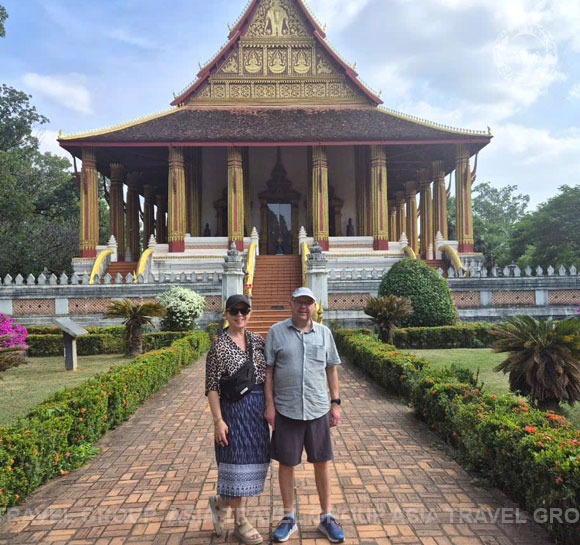
Vientiane, Laos
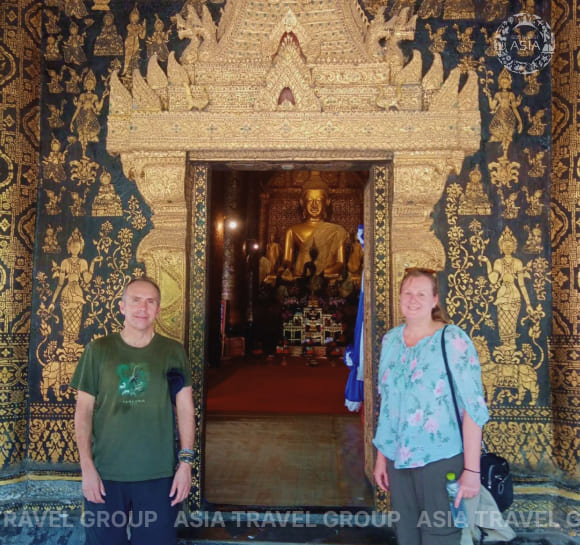
Luang Prabang, Laos
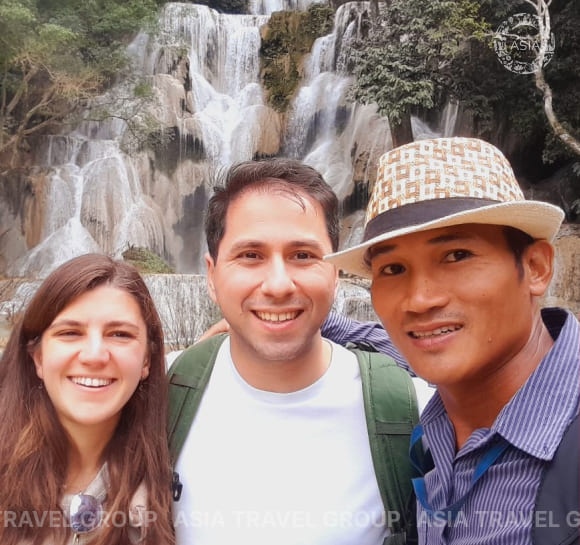
Luang Prabang, Laos
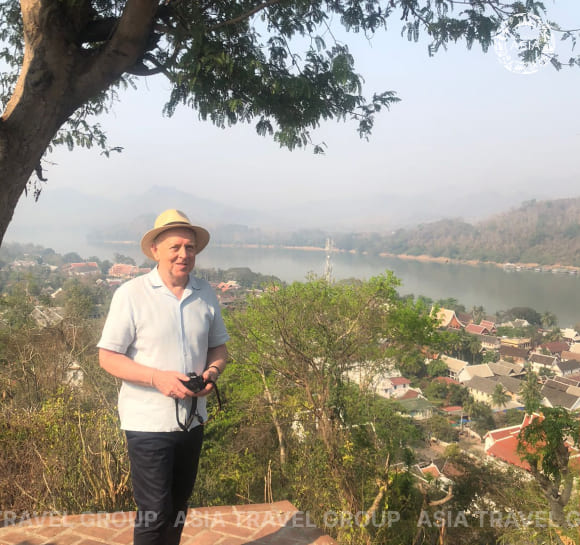
Luang Prabang, Laos
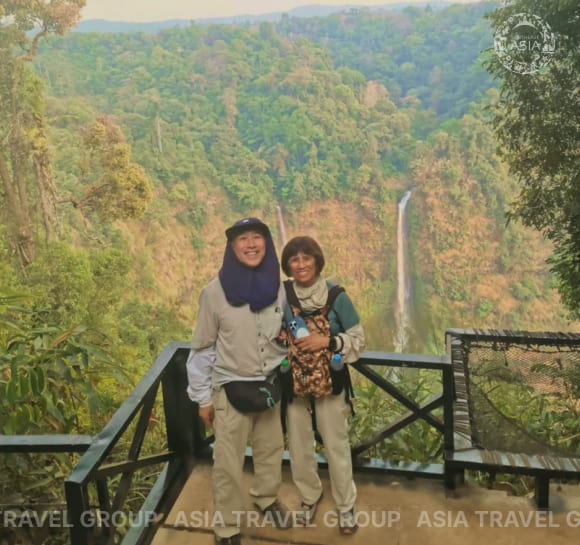
Champasak, Laos
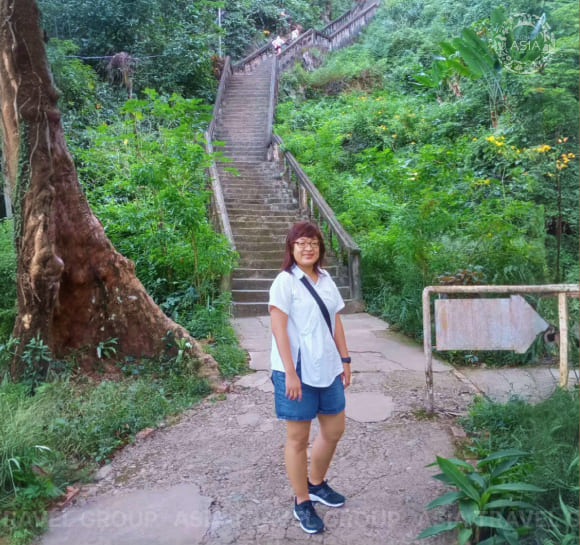
Vang Vieng, Laos
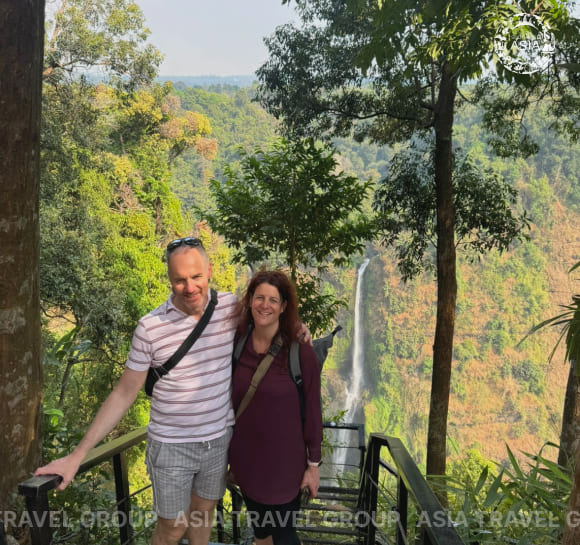
Bolaven Plateau, Laos

Luang Prabang, Laos
BEST laos TOURS
Embark on the ultimate journey with our Best Laos Tours. Each trip offers cherished experiences and authentic adventures in one of Southeast Asia’s lesser-known gems.
Explore the heart and soul of Laos on this tour of the most spectacular spots. Whether you cycle to discover the UNESCO-listed town Luang Prabang, visit the peculiar Pak Ou Caves, explore the mystery of the famous "Plain of Jars" in Xieng Khouang or see the mighty waterfalls in Si Phan Don, you'll get a wonderful insight into the tranquil country of Southeast Asia - Laos during this amazing adventure.
Only From $2380/person
All Inclusive ServiceThis Tour
This nearly two-week trip offers an overview of Laos' enchanting beauty, ticking off all the major destinations like Vientiane, Wat Phou, Luang Prabang, and Vang Vieng in addition to visiting lesser-known towns to interact with the kind locals. For travelers seeking a thorough exploration of Laos' renowned cities and picturesque areas, along with some more off-the-beaten-path stops, this itinerary is the perfect choice. We have designed this journey to make the most of the time available and use different modes of transportation, such as flight, private vehicle, and train that give you the opportunity to experience Laos’ various scenic landscapes.
Only From $2275/person
All Inclusive ServiceThis Tour
The Signature Laos itinerary is a classic and comprehensive 10-day journey that travels from Vientiane to the country’s northern part, combining top landmarks with great cultural excursions and natural encounters. Visit Vientiane, Laos' tranquil capital on the banks of the Mekong River, and the Plain of Jars in Xieng Khouang, a vast archeological site with hundreds of enormous jars scattered throughout the plateau. In Luang Prabang, the "City of the Golden Buddha" and a UNESCO World Heritage Site since 1995, explore ancient temples, Kuang Si waterfalls, and boat trips to the Pak Ou Caves before traveling further to the lesser-known Nong Khiaw and Muang Ngoy. This sample itinerary can be tailored to your specific travel needs or paired with other vacations in Laos.
Only From $1680/person
All Inclusive ServiceThis Tour
This is the sample itinerary for those wanting to explore all of Laos in one trip, from natural experiences to cultural visits. You start at Luang Prabang for ancient temples, forest waterfalls, and boat trips to Pak Ou Caves, then travel to Xieng Khouang to visit the mysterious Plain of Jars and enjoy kayaking along the Nam Song River of Vang Vieng. Stop at the capital Vientiane for a city tour around its top attractions before flying to Luang Namtha to delve deep into the Nam Ha Protected Area for a true eco-experience. Spend four days relaxing in the tranquil Nam Kat Yorla Pa Resort and uncovering the surrounding jungles and waterfalls. Your adventure will end back in Luang Prabang, where you depart the landlocked country of Laos.
Only From $3196/person
All Inclusive ServiceThis Tour
Follow the natural contours of Laos on this extensive two-week journey. From the charming capital Vientiane with elaborate architectural sites, start the discovery of local cultures and stunning landscapes that have formed the untouched Laos. Heading north, you will explore the old-growth jungles of natural protected areas in Luang Nam Tha and Oudomxay before stopping the UNESCO-listed town of Luang Prabang and its remote surrounds. Traveling from south to north, this Laos trip is perfect for adventurers looking for an off-the-beaten-track corner of Southeast Asia.
Only From $2632/person
All Inclusive ServiceThis Tour
This 10-day amazing tour package is the best chance for travelers to explore the hidden treasures of mysterious Laos and feel grateful for the charming cultural beauty of this landlocked country. The first stop of the journey is the World Heritage town of Luang Prabang, then head to the northeast, where you’ll experience the peaceful villages of Nong Khiaw and Muang Ngoy. Travel to the northwest and immerse yourself in the magical rainforest of Namkat Yorla Pa Protected Area before flying to the vibrant capital city of Vientiane. It’s time to unveil the authentic Laos.
Only From $1880/person
All Inclusive ServiceThis Tour
From south to north, the Explore Laos Highlands itinerary will showcase the wonders of Laos, from its natural landscapes and spiritual culture to its laid-back towns and friendly people. Start and end in Vientiane; this 12-day tour will take you to the heart of the landlocked Laos. Explore what makes Luang Prabang a UNESCO World Heritage Site, step back in time on the fields of the famous Plains of Jars, and kayak through the beautiful scenery of Vang Vieng. Traveling beyond the tourist trails, you’ll see a side of Laos that is under the radar of mass tourism.
Only From $2016/person
All Inclusive ServiceThis Tour
Discover Laos, a lovely country in Indochina with no coastline yet renowned for its traditions, magnificent scenery, and incredible architecture. This 16-day authentic Laos tour will take you from the south to the north of the country, visiting top attractions such as Vientiane, Luang Prabang, and the Plain of Jars, as well as off-the-beaten-path stops in Nong Khiaw, Muang Ngoy, and Oudomxay, to gain a better understanding of Laotian customs, people, and regions. The classic feel of temples, mixed with the pleasant natural atmosphere, will certainly give you relief and unforgettable memories.
Only From $3008/person
All Inclusive ServiceThis Tour
Laos is a laid-back country that offers unmatched tranquility and breathtaking scenery to soothe your soul. A visit of Laos promises the most pristine natural beauty and historic grandeur. With our 14-day vacation package, you will explore Laos's calm beauty and diverse culture. This trip will take you through some of the most gorgeous landscapes and ancient landmarks of this country, from the vibrant Vientine to the mysterious Xieng Khuang, from the quaint Luang Prabang to the magnificent Khone Island. Prepare to enjoy the authentic flavors of Lao cuisine and become fully immersed in the local traditions.
Only From $2128/person
All Inclusive ServiceThis Tour
Embark a fascinating 8-day tour to Laos, starting in the UNESCO World Heritage town of Luang Prabang, where you can explore ancient temples, cruise upstream the Mekong River to visit Pak Ou Caves, and experience authentic Lao village life. Traverse to the mysterious landscapes of Xieng Khouang, visit the famous Plain of Jars, and walk around hillsides scattered with the bulk of the jars. The adventure ends in the captital city of Vientiane, where you'll marvel at Wat Sisaket, Patuxai Monument, That Luang Stupa, and Buddha Park's unique sculptures. This eight-day Laos Essential journey combines the urban charm, natural beauty, and cultural diversity of Laos, promising an experience that will never be forgotten.
Only From $1530/person
All Inclusive ServiceThis Tour
Laos is a small but incredibly fascinating country in Southeast Asia that you can explore in just seven days. This Incredible Laos tour plan will walk you through the top destinations, including the historic city of Luang Prabang, the breathtaking scenery of Vang Vieng, and the vibrant culture of Vientiane. Enjoy the turquoise waters of Kuang Si Waterfall, visit ancient temples, experience the authentic Lao rural lifestyle, and make the most of your stay in this captivating country.
Only From $1134/person
All Inclusive ServiceThis Tour
Take this 6-day tour to enjoy the serenity of Laos. Wander around Luang Prabang to see the sights reflecting the history and the rich culture of Laos. Watch the monks collecting alms and visit Kuang Si waterfalls. We then visit the World Heritage - Watphou and transfer to Si Phan Done. After visiting the fabulous Khone Phapaeng waterfall, the biggest of waterfall in Southeast Asia, we return to Pakse for departure.
Only From $948/person
All Inclusive ServiceThis Tour
This Surprising Laos 8 Days travel package will take you on a mesmerizing experience through ancient history, rich culture, and adventurous excursions of the landlocked country. It welcomes all travelers, especially those seeking an authentic and off-the-beaten-path trip. Delve into the heart of the UNESCO-listed World Heritage town of Luang Prabang, soak in the laid-back vibes of Vientiane, and unveil the hidden treasures of Luang Nam Tha. This amazing journey allows you to immerse yourself in the unique ethnic tapestry and natural wonders of Laos with unforgettable memories.
Only From $1344/person
All Inclusive ServiceThis Tour
Join this tour and explore the incredible, land-locked country of Laos with various colorful and charming sites. Take a journey from Vientiane to Luang Prabang to get a true taste of the untouched land. Have a nice stroll around ancient temples and historic landmarks, cool off in crystal-clear waters of stunning waterfalls, visit remote villages, and experience more on authentic cultures which won’t disappoint any dedicated visitors.
Only From $930/person
All Inclusive ServiceThis Tour
Take part in this 8-day tour and traverse through three well-known destinations of Laos, including Luang Prabang, Vientiane, and Si Phan Don, the beautiful southern region of Laos. Explore ancient temples and historical landmarks, take in hidden nature wonders, and witness the local way of life. You will have the chance to enjoy interesting excursions exploring the latent beauty of this enchanting nation and experience the friendliness and hospitability of the plain country people.
Only From $1402/person
All Inclusive ServiceThis Tour
If you are seeking a thrilling adventure in Laos full of unexpected encounters, our 9-day exploration tour package would be the perfect choice. Travelers will embark on an extraordinary journey that takes you through the UNESCO World Heritage Site, Luang Prabang and the rustic charm of Pakse. Immerse yourself in the rich culture and natural beauty of Luang Prabang with visit to ancient temples and cool waterfalls. Then cruise along the Mekong to sleepy villages of Nong Khiaw and Muang Ngoy before heading to the laid-back village life of the Si Phan Don (4000 islands). Get ready to join us on this amazing trip!
Only From $1520/person
All Inclusive ServiceThis Tour
This 6-day tour is for those who want to explore Laos with their families. With stunning nature, rich culture, long history, and friendly people, Laos is really an undiscovered gem in Southeast Asia. The tour will starts from the current capital, Vientiane, and Luang Prabang, the former capital of Laos. Taking this journey, you will have a chance to discover the mixture of colonial French buildings, ancients temples, beautiful natural landscapes, as well as colorful markets.
Only From $972/person
All Inclusive ServiceThis Tour
Nestled at the meeting point of the Khan and Mekong rivers, Luang Prabang is a laid-back town listed as the UNESCO World Heritage List in 1995. On this six-day Luang Prabang highlights itinerary, you will explore a true taste of the local culture and nature beauty of this authentic destination. Immerse yourself in the Kuang Si waterfall and Pak Ou Cave, which are among the top attractions in Luang Prabang. Enjoy thrilling adventures at Nahm Dong Park and play with adorable giants of an elephant camp. Your trip will meaningfully end up with an experience of Luang Prabang local lifestyle at nearby communities.
Only From $1008/person
All Inclusive ServiceThis Tour
Hike, trek, boat, or climb your way to all the best parts of Luang Prabang. This 7-day experience provides an in-depth discovery of Luang Prabang and its surrounds with the help of a knowledgeable local tour guide. You’ll uncover a diverse range of cultural, historic, relaxing, and adventure sites in and around this UNESCO-listed World Heritage town, from the ancient temples in Luang Prabang to the laid-back landscapes in Nong Khiaw and the remote village in Muang Ngoy. Stay active and explore new things in the Land of a Million Elephants.
Only From $1176/person
All Inclusive ServiceThis Tour
This amazing off-the-beaten-path adventure in Laos is ideal for nature enthusiasts and adventurers who want to see the less-traveled northern part of the country. Instead of taking a group tour bus during the nine days of this trip, you will experience a variety of transportation methods to gain a deep understanding of Laotian people's daily lives in the countryside, including boating along a river, trekking through the jungle to remoted villages, biking through the rustic town, and riding a motorbike to a local market. From Pakbeng to Muang Xay, your journey across Laos comes to an end after genuine activities and sightseeing in the enchanting town of Luang Prabang. Pack your bags and join this in-depth trip with us.
Only From $1530/person
All Inclusive ServiceThis Tour
This is the sample itinerary for those wanting to explore all of Laos in one trip, from natural experiences to cultural visits. You start at Luang Prabang for ancient temples, forest waterfalls, and boat trips to Pak Ou Caves, then travel to Xieng Khouang to visit the mysterious Plain of Jars and enjoy kayaking along the Nam Song River of Vang Vieng. Stop at the capital Vientiane for a city tour around its top attractions before flying to Luang Namtha to delve deep into the Nam Ha Protected Area for a true eco-experience. Spend four days relaxing in the tranquil Nam Kat Yorla Pa Resort and uncovering the surrounding jungles and waterfalls. Your adventure will end back in Luang Prabang, where you depart the landlocked country of Laos.
Only From $3196/person
All Inclusive ServiceThis Tour
Follow the natural contours of Laos on this extensive two-week journey. From the charming capital Vientiane with elaborate architectural sites, start the discovery of local cultures and stunning landscapes that have formed the untouched Laos. Heading north, you will explore the old-growth jungles of natural protected areas in Luang Nam Tha and Oudomxay before stopping the UNESCO-listed town of Luang Prabang and its remote surrounds. Traveling from south to north, this Laos trip is perfect for adventurers looking for an off-the-beaten-track corner of Southeast Asia.
Only From $2632/person
All Inclusive ServiceThis Tour
This 10-day amazing tour package is the best chance for travelers to explore the hidden treasures of mysterious Laos and feel grateful for the charming cultural beauty of this landlocked country. The first stop of the journey is the World Heritage town of Luang Prabang, then head to the northeast, where you’ll experience the peaceful villages of Nong Khiaw and Muang Ngoy. Travel to the northwest and immerse yourself in the magical rainforest of Namkat Yorla Pa Protected Area before flying to the vibrant capital city of Vientiane. It’s time to unveil the authentic Laos.
Only From $1880/person
All Inclusive ServiceThis Tour
From south to north, the Explore Laos Highlands itinerary will showcase the wonders of Laos, from its natural landscapes and spiritual culture to its laid-back towns and friendly people. Start and end in Vientiane; this 12-day tour will take you to the heart of the landlocked Laos. Explore what makes Luang Prabang a UNESCO World Heritage Site, step back in time on the fields of the famous Plains of Jars, and kayak through the beautiful scenery of Vang Vieng. Traveling beyond the tourist trails, you’ll see a side of Laos that is under the radar of mass tourism.
Only From $2016/person
All Inclusive ServiceThis Tour
Discover Laos, a lovely country in Indochina with no coastline yet renowned for its traditions, magnificent scenery, and incredible architecture. This 16-day authentic Laos tour will take you from the south to the north of the country, visiting top attractions such as Vientiane, Luang Prabang, and the Plain of Jars, as well as off-the-beaten-path stops in Nong Khiaw, Muang Ngoy, and Oudomxay, to gain a better understanding of Laotian customs, people, and regions. The classic feel of temples, mixed with the pleasant natural atmosphere, will certainly give you relief and unforgettable memories.
Only From $3008/person
All Inclusive ServiceThis Tour
Laos is a laid-back country that offers unmatched tranquility and breathtaking scenery to soothe your soul. A visit of Laos promises the most pristine natural beauty and historic grandeur. With our 14-day vacation package, you will explore Laos's calm beauty and diverse culture. This trip will take you through some of the most gorgeous landscapes and ancient landmarks of this country, from the vibrant Vientine to the mysterious Xieng Khuang, from the quaint Luang Prabang to the magnificent Khone Island. Prepare to enjoy the authentic flavors of Lao cuisine and become fully immersed in the local traditions.
Only From $2128/person
All Inclusive ServiceThis Tour
Embark a fascinating 8-day tour to Laos, starting in the UNESCO World Heritage town of Luang Prabang, where you can explore ancient temples, cruise upstream the Mekong River to visit Pak Ou Caves, and experience authentic Lao village life. Traverse to the mysterious landscapes of Xieng Khouang, visit the famous Plain of Jars, and walk around hillsides scattered with the bulk of the jars. The adventure ends in the captital city of Vientiane, where you'll marvel at Wat Sisaket, Patuxai Monument, That Luang Stupa, and Buddha Park's unique sculptures. This eight-day Laos Essential journey combines the urban charm, natural beauty, and cultural diversity of Laos, promising an experience that will never be forgotten.
Only From $1530/person
All Inclusive ServiceThis Tour
Laos is a small but incredibly fascinating country in Southeast Asia that you can explore in just seven days. This Incredible Laos tour plan will walk you through the top destinations, including the historic city of Luang Prabang, the breathtaking scenery of Vang Vieng, and the vibrant culture of Vientiane. Enjoy the turquoise waters of Kuang Si Waterfall, visit ancient temples, experience the authentic Lao rural lifestyle, and make the most of your stay in this captivating country.
Only From $1134/person
All Inclusive ServiceThis Tour
Take this 6-day tour to enjoy the serenity of Laos. Wander around Luang Prabang to see the sights reflecting the history and the rich culture of Laos. Watch the monks collecting alms and visit Kuang Si waterfalls. We then visit the World Heritage - Watphou and transfer to Si Phan Done. After visiting the fabulous Khone Phapaeng waterfall, the biggest of waterfall in Southeast Asia, we return to Pakse for departure.
Only From $948/person
All Inclusive ServiceThis Tour
This Surprising Laos 8 Days travel package will take you on a mesmerizing experience through ancient history, rich culture, and adventurous excursions of the landlocked country. It welcomes all travelers, especially those seeking an authentic and off-the-beaten-path trip. Delve into the heart of the UNESCO-listed World Heritage town of Luang Prabang, soak in the laid-back vibes of Vientiane, and unveil the hidden treasures of Luang Nam Tha. This amazing journey allows you to immerse yourself in the unique ethnic tapestry and natural wonders of Laos with unforgettable memories.
Only From $1344/person
All Inclusive ServiceThis Tour
Join this tour and explore the incredible, land-locked country of Laos with various colorful and charming sites. Take a journey from Vientiane to Luang Prabang to get a true taste of the untouched land. Have a nice stroll around ancient temples and historic landmarks, cool off in crystal-clear waters of stunning waterfalls, visit remote villages, and experience more on authentic cultures which won’t disappoint any dedicated visitors.
Only From $930/person
All Inclusive ServiceThis Tour
Take part in this 8-day tour and traverse through three well-known destinations of Laos, including Luang Prabang, Vientiane, and Si Phan Don, the beautiful southern region of Laos. Explore ancient temples and historical landmarks, take in hidden nature wonders, and witness the local way of life. You will have the chance to enjoy interesting excursions exploring the latent beauty of this enchanting nation and experience the friendliness and hospitability of the plain country people.
Only From $1402/person
All Inclusive ServiceThis Tour
If you are seeking a thrilling adventure in Laos full of unexpected encounters, our 9-day exploration tour package would be the perfect choice. Travelers will embark on an extraordinary journey that takes you through the UNESCO World Heritage Site, Luang Prabang and the rustic charm of Pakse. Immerse yourself in the rich culture and natural beauty of Luang Prabang with visit to ancient temples and cool waterfalls. Then cruise along the Mekong to sleepy villages of Nong Khiaw and Muang Ngoy before heading to the laid-back village life of the Si Phan Don (4000 islands). Get ready to join us on this amazing trip!
Only From $1520/person
All Inclusive ServiceThis Tour
This 6-day tour is for those who want to explore Laos with their families. With stunning nature, rich culture, long history, and friendly people, Laos is really an undiscovered gem in Southeast Asia. The tour will starts from the current capital, Vientiane, and Luang Prabang, the former capital of Laos. Taking this journey, you will have a chance to discover the mixture of colonial French buildings, ancients temples, beautiful natural landscapes, as well as colorful markets.
Only From $972/person
All Inclusive ServiceThis Tour
Nestled at the meeting point of the Khan and Mekong rivers, Luang Prabang is a laid-back town listed as the UNESCO World Heritage List in 1995. On this six-day Luang Prabang highlights itinerary, you will explore a true taste of the local culture and nature beauty of this authentic destination. Immerse yourself in the Kuang Si waterfall and Pak Ou Cave, which are among the top attractions in Luang Prabang. Enjoy thrilling adventures at Nahm Dong Park and play with adorable giants of an elephant camp. Your trip will meaningfully end up with an experience of Luang Prabang local lifestyle at nearby communities.
Only From $1008/person
All Inclusive ServiceThis Tour
Hike, trek, boat, or climb your way to all the best parts of Luang Prabang. This 7-day experience provides an in-depth discovery of Luang Prabang and its surrounds with the help of a knowledgeable local tour guide. You’ll uncover a diverse range of cultural, historic, relaxing, and adventure sites in and around this UNESCO-listed World Heritage town, from the ancient temples in Luang Prabang to the laid-back landscapes in Nong Khiaw and the remote village in Muang Ngoy. Stay active and explore new things in the Land of a Million Elephants.
Only From $1176/person
All Inclusive ServiceThis Tour
This amazing off-the-beaten-path adventure in Laos is ideal for nature enthusiasts and adventurers who want to see the less-traveled northern part of the country. Instead of taking a group tour bus during the nine days of this trip, you will experience a variety of transportation methods to gain a deep understanding of Laotian people's daily lives in the countryside, including boating along a river, trekking through the jungle to remoted villages, biking through the rustic town, and riding a motorbike to a local market. From Pakbeng to Muang Xay, your journey across Laos comes to an end after genuine activities and sightseeing in the enchanting town of Luang Prabang. Pack your bags and join this in-depth trip with us.
Only From $1530/person
All Inclusive ServiceThis Tour

With over 16 years of experience, our team will help you choose the perfect for your adventure.

Authentic

Flexible

Persionalized

24/7 Support


laos TOUR styles
No matter what interests you in Laos, we’ll craft your perfect, tailor-made journey. Get inspired by our sample trips in different styles and contact us to create your own adventure.
laos destinations
Laos, the region’s hidden gem, captivates with its serene landscapes, ancient temples, and rich culture. Tour around its stunning destinations and get the authentic Southeast Asian vibe.
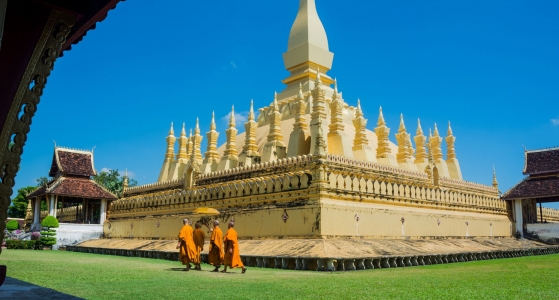
Laos was once a French colony, and the French influence is still evident in its capital, both in the cuisine and architecture. The boulevard along the Mekong River is a great place to stroll, with lots of charming restaurants, cafes, and a huge, lively night market. While Vientiane’s beauty and allure are less readily evident than in other historic cities in the region, it has a few enchanting secrets up its sleeve that are well worth exploring.
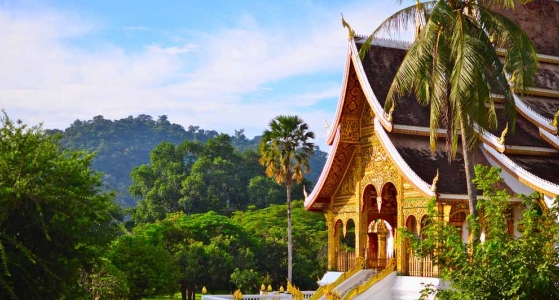
Luang Prabang is a historic city that once served as the capital of the Kingdom of Laos. At the meeting point of the Mekong and Nam Khan rivers, this town stands in front of a magnificent hilltop temple. Luang Prabang is perhaps one of Indochina’s most alluring towns. Very walkable-friendly, it is wrapped in an uncommon peace and spirituality that reaches well beyond its over three-dozen Buddhist temples.
Located in central Laos, this quiet town offers a 450-kilometer motorbike loop through some of the most beautiful and remote parts of the country, including the massive Kong Lor Caves and the Buddha Cave. The journey can take between two and four days, depending on the number of stops and the route starting and ending at Thakhek town. The improved quality of the roads means even novice riders will enjoy the ride.
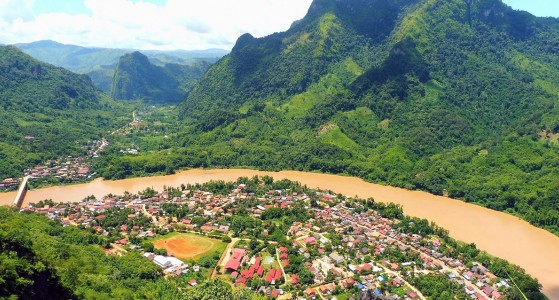
If you are interested in nature or adventure, this is one of the best places to visit in Laos. The area has some amazing treks and cycle routes around the scenic villages surrounding the main town. Nong Khiaw is also on the banks of the delightful Nam Ou River, so a boat trip is a great way to experience the area.
Muang Ngoi is a beautiful small town in northern Laos, accessible by boat from Nong Khiaw. This remote river village is ideal for those who want to immerse themselves in authentic peaceful life. The surrounding unspoiled natural area has caves, is great for adventurous treks and kayaking, and its panoramic views make it one of the most beautiful places in Laos.
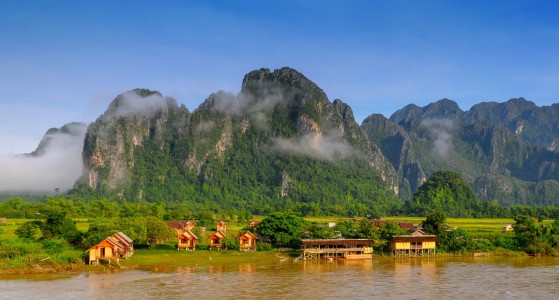
Vang Vieng is the premier destination for outdoor adventure, perfect for those who want to go caving, climbing, and kayaking. The town is sandwiched between these karst cliffs and the palm-fringed river, and it’s simply one of the most picturesque spots in Southeast Asia. Even if adventure isn’t your thing, relaxing on the banks of the Song River or strolling through the sleepy nearby town is a charming respite from reality.
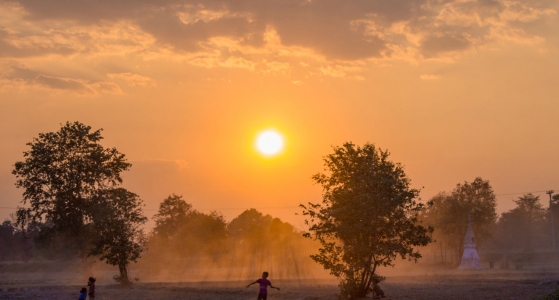
Si Phan Don is a series of various-sized islands dotted along the Mekong River in southern Laos; most are very small and uninhabited. The biggest and most popular islands are Don Det and Don Khong. They have a very laid-back atmosphere and are very easy to explore by bicycle, passing by paddy fields, villages, and beautiful waterfalls. You might even be lucky enough to spot some Irrawaddy dolphins.
Located at the confluence of the Se Done and Mekong rivers, Pakse is the most important economic and tourism center in southern Laos. It is also the perfect base for exploring the famous Bolaven Plateau. This is a stunning park with numerous waterfalls and coffee and tea plantations, making it one of the most beautiful places in Laos. You can visit the Bolaven Plateau as part of an organized tour or by renting a scooter or tuk-tuk.
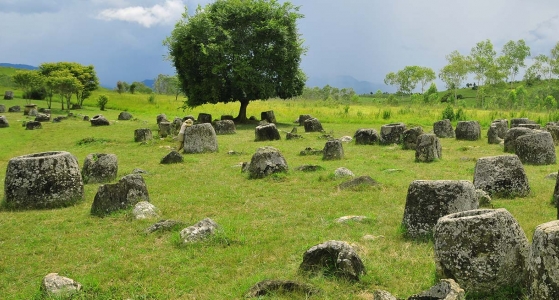
Xiangkhouang is a northeast province which is the home to the well-known Plain of Jars – one of the landmarks in Laos. Tourists often choose XiangKhuoang as a stop for short adventures exploring...
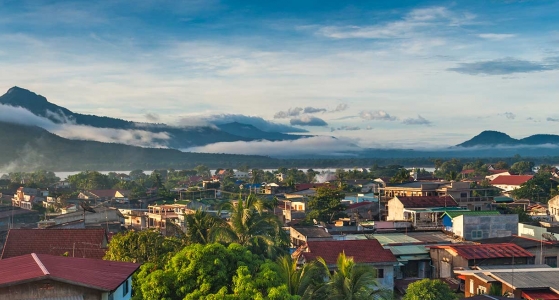
Huay Xai is a small village on the Mekong River in Laos. It is a popular place for boat tours, trekking to traditional mountain communities, and homestay experiences. The most famous nearby attraction is Bokeo Nature Reserve, known for its spectacular gibbon experience. The forests are home to some of the last remaining groups of black-cheeked gibbons in Laos, and travelers can support conservation as well as have an opportunity to see these animals in their natural habitat.
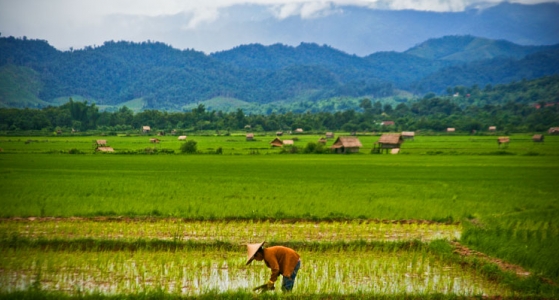
Luang Namtha is a province located in the northwest of Laos. Famous for Nam Ha National Protected Areas – a well-known ecotourism destination, Luang Namtha attracts tourists by its authenticity of...
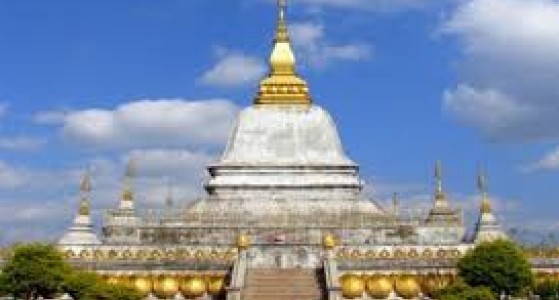
Situated to the upper North, Oudomxay welcomes tourists by its untouched nature and the charming beauty of different hill tribes. The province is also one of the best places for cloud-hunting in...

Laos was once a French colony, and the French influence is still evident in its capital, both in the cuisine and architecture. The boulevard along the Mekong River is a great place to stroll, with lots of charming restaurants, cafes, and a huge, lively night market. While Vientiane’s beauty and allure are less readily evident than in other historic cities in the region, it has a few enchanting secrets up its sleeve that are well worth exploring.

Luang Prabang is a historic city that once served as the capital of the Kingdom of Laos. At the meeting point of the Mekong and Nam Khan rivers, this town stands in front of a magnificent hilltop temple. Luang Prabang is perhaps one of Indochina’s most alluring towns. Very walkable-friendly, it is wrapped in an uncommon peace and spirituality that reaches well beyond its over three-dozen Buddhist temples.

If you are interested in nature or adventure, this is one of the best places to visit in Laos. The area has some amazing treks and cycle routes around the scenic villages surrounding the main town. Nong Khiaw is also on the banks of the delightful Nam Ou River, so a boat trip is a great way to experience the area.

Vang Vieng is the premier destination for outdoor adventure, perfect for those who want to go caving, climbing, and kayaking. The town is sandwiched between these karst cliffs and the palm-fringed river, and it’s simply one of the most picturesque spots in Southeast Asia. Even if adventure isn’t your thing, relaxing on the banks of the Song River or strolling through the sleepy nearby town is a charming respite from reality.

Si Phan Don is a series of various-sized islands dotted along the Mekong River in southern Laos; most are very small and uninhabited. The biggest and most popular islands are Don Det and Don Khong. They have a very laid-back atmosphere and are very easy to explore by bicycle, passing by paddy fields, villages, and beautiful waterfalls. You might even be lucky enough to spot some Irrawaddy dolphins.

Xiangkhouang is a northeast province which is the home to the well-known Plain of Jars – one of the landmarks in Laos. Tourists often choose XiangKhuoang as a stop for short adventures exploring...

Huay Xai is a small village on the Mekong River in Laos. It is a popular place for boat tours, trekking to traditional mountain communities, and homestay experiences. The most famous nearby attraction is Bokeo Nature Reserve, known for its spectacular gibbon experience. The forests are home to some of the last remaining groups of black-cheeked gibbons in Laos, and travelers can support conservation as well as have an opportunity to see these animals in their natural habitat.

Luang Namtha is a province located in the northwest of Laos. Famous for Nam Ha National Protected Areas – a well-known ecotourism destination, Luang Namtha attracts tourists by its authenticity of...

Situated to the upper North, Oudomxay welcomes tourists by its untouched nature and the charming beauty of different hill tribes. The province is also one of the best places for cloud-hunting in...
quick facts about Laos
Population
Southeast Asia
Capital City
Vientiane
Currency
Kip (LAK)
Language
Lao
Timezone
(GMT+07:00) Bangkok, Hanoi, Jakarta
Country code
+856
Main religion
Buddhism, Tai folk religion, Christianity, Hinduism, and Islam
Electricity
Type A (North American/Japanese 2-pin), Type B (North American/Japanese 3-pin), Type C (European 2-pin)
Region
Southeast Asia
Capital City
Vientiane
Currency
Kip (LAK)
Language
Lao
Timezone
(GMT+07:00) Bangkok, Hanoi, Jakarta
Country code
+856
Main religion
Buddhism, Tai folk religion, Christianity, Hinduism, and Islam
Electricity
Type A (North American/Japanese 2-pin), Type B (North American/Japanese 3-pin), Type C (European 2-pin)
laos Travel Guide
Explore the timeless beauty of Laos with our travel guides, crafted to help you uncover its peaceful landscapes, vibrant traditions, and lesser-known treasures. Whether you’re drawn to ancient temples, scenic rivers, or authentic local experiences, our expert insights ensure a rewarding journey in Laos. Let us guide you beyond the usual paths while in this enchanting country.
Guide to Laos Family Tours: A Perfect Adventure for All Ages
Laos, a hidden gem in Southeast Asia, is an ideal destination for family tours. Known for its rich culture, spectacular landscapes, and warm hospitality, Laos offers unique experiences that cater to...
Best Things to Do in Laos: A Journey Through the Land of a Million Elephants
Nestled between Thailand, Vietnam, Cambodia, China, and Myanmar, Laos is a landlocked country rich in culture, natural beauty, and adventure. Often overshadowed by its more touristy neighbors, Laos...
Vietnam, Cambodia, Laos Tours: Most Photogenic UNESCO World Heritage Site
Southeast Asia is home to some of the world’s most stunning UNESCO World Heritage Sites, each offering a glimpse into the rich history, culture, and natural beauty of the region. Vietnam, Cambodia,...
Guide to Laos Family Tours: A Perfect Adventure for All Ages
Laos, a hidden gem in Southeast Asia, is an ideal destination for family tours. Known for its rich culture, spectacular landscapes, and warm hospitality, Laos offers unique experiences that cater to...
Best Things to Do in Laos: A Journey Through the Land of a Million Elephants
Nestled between Thailand, Vietnam, Cambodia, China, and Myanmar, Laos is a landlocked country rich in culture, natural beauty, and adventure. Often overshadowed by its more touristy neighbors, Laos...
Vietnam, Cambodia, Laos Tours: Most Photogenic UNESCO World Heritage Site
Southeast Asia is home to some of the world’s most stunning UNESCO World Heritage Sites, each offering a glimpse into the rich history, culture, and natural beauty of the region. Vietnam, Cambodia,...

Customize laos tours


Adventure Travel Trade Association -ATTA#852025


American Society of Travel Agents - ASTA#900385282

Family Travel Association - FTA#4092797


Tripadvisor Travelers Choice Awards


As seen in The Guardian


World Travel Awards Winners 2025
ABOUT US
Why Us What the clients say about us Trusted Travel Company What Makes Us Different Meet Our Team Southeast Asia Travel Guide Southeast Asia Tour Highlights Pre-departures Deposit & Payment Cancellation Policy Terms and Conditions Contact UsOur Destinations
Vietnam Tours Cambodia Tours Thailand Tours Indonesia Tours Malaysia Tours Philippines Tours Laos Tours Singapore Tours Myanmar ToursMulti-country
Vietnam Cambodia Tours Vietnam Cambodia Laos Tours Vietnam Thailand Tours Vietnam Cambodia Thailand Tours Thailand Malaysia Tours Thailand Malaysia Indonesia Tours Indonesia Thailand Tours Indonesia Malaysia Vietnam Tours Southeast Asia Tours 26 - 30 Days Southeast Asia Tours 18 - 26 Days Southeast Asia Tours 12 - 18 DaysTravel Themes
Best Southeast Asia Tours Southeast Asia Heritage & Culture Tours Southeast Asia Nature & Wildlife Tours Southeast Asia Family Tours Southeast Asia Honeymoon Tours Southeast Asia Adventure & Outdoor Tours Southeast Asia Beach & Island Tours Southeast Asia Cruise Tours Southeast Asia Tours 8 - 12 Days Southeast Asia Tours < 8 DaysSOUTHEAST ASIA TRAVEL COMPANY LIMITED
Southeast Asia Travel is an award-winning travel company specializing in bespoke, private and luxury tour packages across Vietnam, Laos, Cambodia, Thailand, Singapore, Malaysia, Indonesia, Myanmar, the Philippines and beyond. With over 15 years of industry expertise, we have guided more than 30,000 travelers on unforgettable journeys through the heart of Southeast Asia. Every Southeast Asia Tour we create is fully customized to reflect your interests, whether you seek hidden gems, iconic landmarks or personalized experiences.
Read more
